The official publication of the Massachusetts State Automobile Dealers Association, Inc
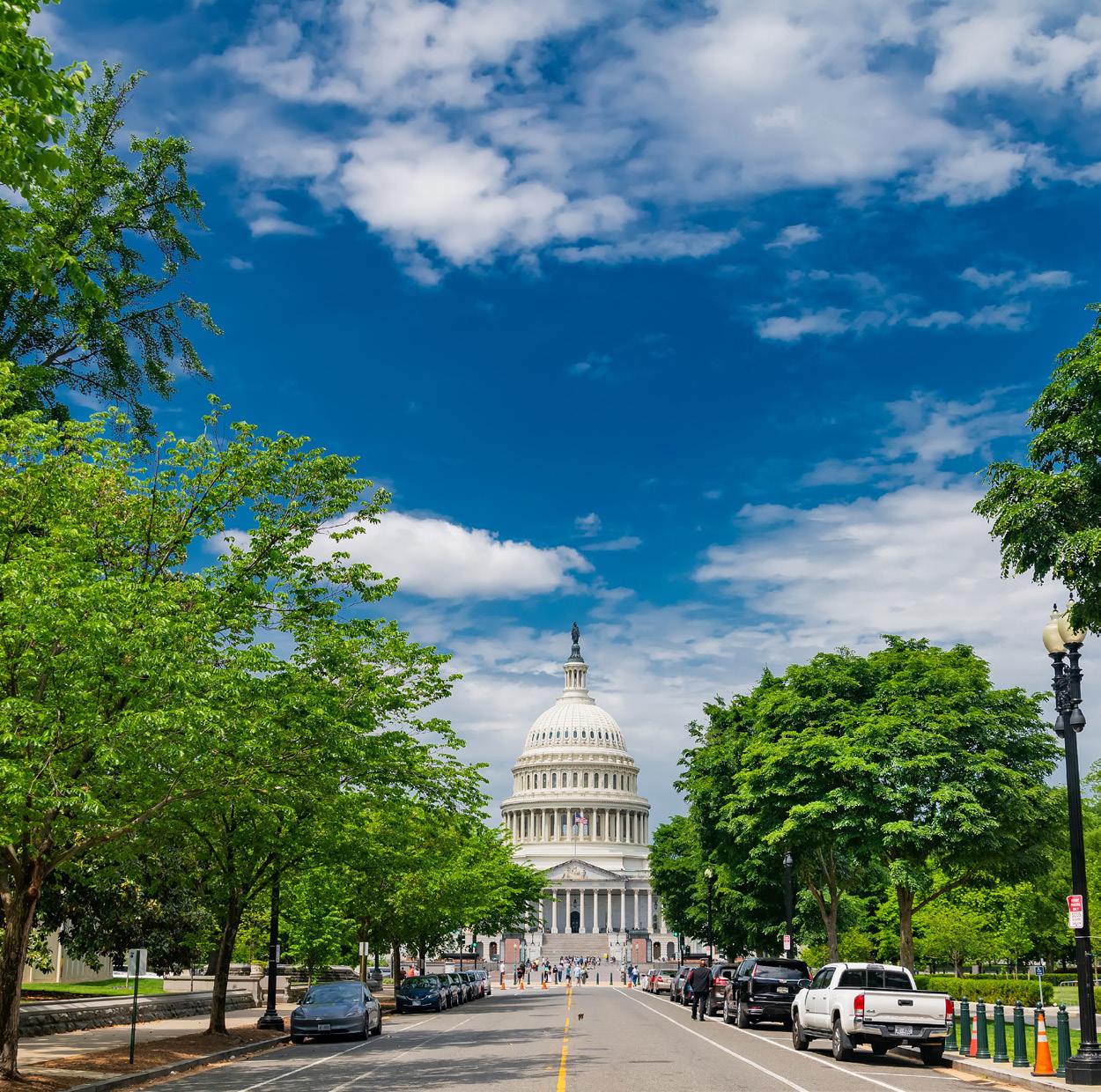


St A ff Directory
Robert O’Koniewski, Esq. executive Vice President rokoniewski@msada.org
Jean Fabrizio wwwDirector of Administration jfabrizio@msada.org
Auto De A ler MAg A zine
Robert O’Koniewski, Esq. executive editor MSADA o ne McKinley Square Sixth f loor Boston, MA 02109
Subscriptions provided annually to Massachusetts member dealers. All address changes should be submitted to MSADA by e-mail: jfabrizio@msada.org
california Dealers group challenges Sony Honda’s Direct Sales Model
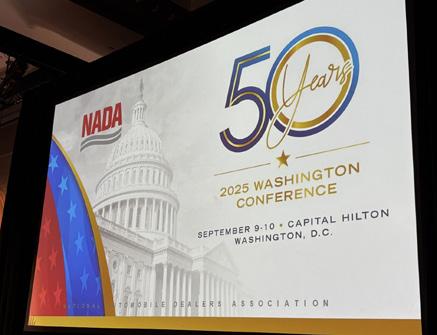
29 ethos group, 35 gW Marketing Services, 25 Merchant Advocate, 21 MSADA Annual Meeting, 2 reynolds & reynolds, 22 Sprague energy, 33 Withum, 43
nAdA UPdAte: Washington conference concludes as Prep continues for 2026 Show ADVertiSing rAteS inquire for multiple-insertion discounts or full Media Kit. e-mail jfabrizio@msada.org
Corner: D.c. Welcomes truck Dealers, Again


By Jeb Balise, MSADA President
Every year, we use several outreach programs to visit with our Members of Congress to make sure our representatives understand that the policies they pursue should be focused on making it easier to do business, not harder. We are not seeking any special favors or privileges, just a level playing field.
To be able to confront such challenges, it is always important to engage our elected politicians and regulatory parties at all levels. As we cover in this month’s issue, September’s NADA Washington Conference afforded us the opportunity to meet with our Members of Congress and their staffs to provide the dealer side of several on-going matters that impact our businesses and the livelihood of our employees.
We can never stop putting effort into making sure our representatives know who we are, what we do, and how vital our contribution is to their districts and our communities.
I want to thank the dealers who traveled to D.C. for the annual conference with MSADA Executive Vice President Robert O’Koniewski and our NADA Director, Scott Dube of the McGovern Auto Group, to make sure our voice is heard: MSADA Immediate Past President Chris Connolly of Herb Connolly Chevrolet; Next Gen dealer Vincent Mastria of the Mastria Auto Group; and Adam Silverleib of the Silko Auto Group. They were also joined by Mike Sullivan of Group One Auto, which has numerous dealerships in Massachusetts.
It is vital to our success as an organization that our next generation of dealership leaders step up to participate and become involved with our legislative outreach. We can never stop putting effort into making sure our representatives know who we are, what we do, and how vital our contribution is to their districts and our communities. Without our input, politicians will have to decide on matters potentially unaware of the impact they will have on our businesses, employees, and customers.
I want to continue to stress the importance of your voice in this process. We make the trip down to D.C. so you do not have to, but that does not mean you should not pick up the phone and let your legislator know what issues you care about as an important economic engine in their community. Please let me or Bob know if you would like any talking points or other tips for representing our business
MSada BoaRd
Barnstable County
Brad tracy, tracy Volkswagen
Berkshire County
Brian Bedard, Bedard Brothers Auto Sales
Bristol County
richard Mastria, Mastria Auto group
Essex County
William Deluca iii, Bill Deluca family of Dealerships
Paul Bertoli, Priority chryslerJeep Dodge ram
Franklin County [open]
Hampden County
Jeb Balise, Balise Auto group
Hampshire County
Bryan Burke, Burke chevrolet
Middlesex County frank Hanenberger, MetroWest Subaru
Norfolk County
Jack Madden, Jr., Jack Madden ford charles tufankjian, toyota Scion of Braintree
Plymouth County
christine Alicandro, Marty’s Buick gMc isuzu
Suffolk County [open]
Worcester County
Steven Sewell, Westboro chrysler Dodge ram Jeep
Steve Salvadore, Salvadore Auto
Medium/Heavy-Duty Truck Dealer
Director-at-Large [open]
Immediate Past President
chris connolly, Jr., Herb connolly chevrolet NADA Director
Scott Dube, Mcgovern Hyundai rt.93
President, Jeb Balise
Vice President, Steve Sewell
Treasurer, Jack Madden, Jr. Clerk, c harles tufankjian

ACV Auctions
Steve Sirko (856) 381-3914
ADESA
Elizabeth Morich (508) 270-5400
Albin, Randall & Bennett
Barton D. Haag (207) 772-1981
Allied Recycling Center
Joseph Castaneda (781) 316-7180
Ally
Maryanne Recupero (617) 997-9574
American Fidelity Assurance Co.
Kathleen Weisenbach (402) 523-5945
America’s Auto Auction Boston
Chris Colocousis (774) 218-8930
ArentFox LLP
Paul Marshall Harris (617) 973-6179
Sarah Decatur Judge (617) 973-6184
Armatus Dealer Uplift
Joe Jankowski (410) 391-5701
Auto Auction of New England
Steven DeLuca (603) 437-5700
Bank of America Merrill Lynch
Stephen Delaney (781) 981-9370
Nancy Price (781) 534-8543
BCI Financial Corp.
Timothy Rourke (860) 302-7127
Bellavia Blatt
Leonard Bellavia (516) 873-3000
Bernstein Shus
Nicholas Higgins (207) 228-7191
Broadway Equipment Company
Fred Bauer (860) 798-5869
Cambridge Trust
David Sawyer (617) 620-3484
CBIZ
Nichole Rene (203) 781-9690
CDK Global
Rob Steele (508) 564-1346
Citrin Cooperman
Ron Masiello (508) 757-3311
Clifton Larson Allen
Nick Chappell (508) 930-2199
Cooperative Systems
Scott Spatz (860) 250-4965
Cox Automotive
Polly Penna (303) 981-1298
CVR
John Alviggi (267) 419-3261
Dave Cantin Group
Woody Woodward (401) 465-7000
Shannon Wischmeyer (636) 293-8038
Downey & Company
Paul McGovern (781) 849-3100
DP Sales Distributors
Andrew Prussack {631) 842-7549
Driving Dealer Performance
Kimberly Guerin (978) 760-0322
EasyCare New England
Greg Gomer (617) 967-0303
eDealer Services, LLC
Tom McKinnon (617) 631-3293
Ethos Group, Inc.
Drew Spring (617) 694-9761
EVready Energy
Chris Nihan (978) 406-1578
Federated Insurance
Kevin Sundberg (559) 547-9694
Fisher Phillips LLP
Jeff Fritz (617) 532-9325
Josh Nadreau (617) 532-9323
Freedom Solar Power
Ryan Ferrero (970) 214-4433
GW Marketing Services
Gordon Wisbach (857) 404-0226
Harris Beach Murtha Cullina
Thomas Vangel (617) 457-4072
Hilb Group
James Pietro (508) 791-5566
Huntington National Bank
Mark Flibotte (781) 724-3749
JM&A Group
Chris “KC” Hwang (954) 415-6961
Key Bank
Tom Flynn (716) 998-6247
M & T Bank
John Federici (401) 642-5622
Maverick Document Signings
Lisa Spring (310) 739-6967
McWalter Volunteer Benefits Group
Shawn Allen (617) 483-0359
Merchant Advocate, LLC
Dan Giordano (973) 897-2778
Mintz Levin
Kurt Steinkrauss (617) 542-6000
Nancy Phillips Associates, Inc.
Nancy Phillips (603) 658-0004
National Business Brokers
Peter DiPersia (603) 881-3895
National Grid
Nicole Caruso-Carlin (347) 426-6331
NEAD Insurance Trust
Charles Muise (781) 706-6944
Northeast Dealer Services
Johna Cutlip (401) 243-7331
OCD Tech
Michael Hammond (844) 623-8324
Performance Brokerage Services
Jacob Stoehr (847) 323-0014
Performance Management Group, Inc.
Dale Ducasse (508) 393-1400
Piper Consulting
Jim Piper (207) 754-0789
Plug In America
Joel Levin (237) 925-1364
Pozerski Hatch & Company
Chris Ernst (781) 953-3627
Pullman & Comley LLC
James F. Martin, Esq. (413) 314-6160
Reynolds & Reynolds
Austin Ziske (802) 505-0016
Rockland Trust Co.
Joseph Herzog (508)-830-3241
Santander Bank
Richard Anderson (401) 432-0749
Chris Peck (508) 314-1283
Schlossberg, LLC
Michael O’Neil, Esq. (781) 848-5028
Southern Auto Auction
Joe Derohanian (860) 292-7500
Sprague Energy
Steve Borelli (508) 768-5252
The Towne Law Firm P.C.
James T. Towne, Jr. (518) 452-1800
TrueCar
Lauren Bailey (703) 909-1625
Truist
Andrew Carmer (401) 409-9467
Twelve Points Wealth Management
Taylor Duffy (978) 318-9500
Wells Fargo Dealer Services
Rich DeFreitas (857) 205-2780
Withum
Kevin Carnes (617) 471-1120
Zurich American Insurance Company
Steven Megee (774) 210-0092
alogue on such issues as overturning the EPA’s efforts to impose onerous rules on fuel economy standards and EV mandates, promulgated during the previous administration; catalytic converter anti-theft legislation; and so-called “right to repair” legislation that has been refiled for this session. We also talked about the impact tariffs have on vehicle pricing and inventory at dealerships and the need for increased federal commitment on work-force training and education, especially in the auto repair footprint.
During our two days of meetings in D.C., we conferred with Reps. Jake Auchincloss (D-Newton) and Richard Neal (D-Springfield), who is the ranking Democrat on the all-powerful House Ways and Means Committee, and staff members for Reps. Lori Trahan (D-Westford), Jim McGovern (D-Worcester), Stephen Lynch (D-South Boston), Katherine Clark (D-Revere), Seth Moulton (D-Salem), and William Keating (D-Bourne).
Moving forward, we need to keep in mind that for our time in D.C. we collectively were a group of small businessmen and women who, on behalf of their fellow dealers back home, gave up time from their dealerships and families to fly to Washington to discuss issues important to their stores and making sure the economy remains progressing in a positive direction. Back home in the Commonwealth, however, we are an association of 427 members, whose dealerships employ on average 60 men and women, and who are responsible for almost 20 percent of the Commonwealth’s retail economy.
There always exists a great need to go before our elected officials and inform them of our concerns and desires. As we ask dealers to get more engaged in contacting their Congresspeople and local legislators, we ask that you not be shy and let others carry the load. All dealers – big and small, domestic makes and international –are in the same boat. If we give the Members of Congress a free ride and do not engage them on the issues, they will think we have no problems. The same is true when we are fighting for or against certain laws on Beacon Hill.
In the future, please heed the call from your Association to contact your elected officials when issues arise. Without our input, our esteemed Members of Congress, if left to their own devices, could find a way to pour more gasoline on the fire. After all, the easiest vote they can take is one in which no one talks to them.
The federal clean vehicle tax credits expire at the close of September 30. However, depending on when certain paperwork is filed by that time, transactions may still be viable after September 30.
On September 29, the Internal Revenue Service, which administers the tax credit program, issued the following reminder on how best to handle the EV tax credits paperwork in the waning hours of the program, which we covered in MSADA Bulletin #134 (9/29/30).
Important Reminders Related to the Termination of the Clean Vehicle Credits: The One, Big, Beautiful Bill (OBBB) (Public Law 119-21, 139 Stat. 72 (July 4, 2025)), accelerated the termination of the Clean Vehicle Credit, sections 30D, 25E, and 45W. On August 21, 2025, IRS issued frequently asked questions (FAQs) in Fact Sheet 2025-05 (which is found on the IRS website at www.irs.gov) relating to the modification of sections 25C, 25D, 25E, 30C, 30D, 45L, 45W, and 179D under the One, Big, Beautiful Bill (OBBB).
Key points in the FAQs include:
• New user registrations for the Clean Vehicle Credit program, through the Energy Credits Online (ECO) portal, will close on September 30, 2025.
• The ECO portal will remain open beyond September 30, 2025, for limited usage by previously registered users to submit time of sale reports and updates to such reports, such as when there has been a vehicle returned.
Important Reminders:
• If you are not fully registered to use ECO and anticipate needing to submit a time of sale report and/or request the buyer’s credit when they elect to transfer their credit to the dealer at the time of
sale, please register now.
• Please promptly submit time of sale reports, returns, and cancellations. Note: Time of sale reports are required to be submitted through ECO within 3 calendar days of the date of sale.
• Dealers can now upload supporting documentation with the submission of a time of sale report. Dealers are encouraged to upload supporting documentation such as the complete vehicle deal jacket and any documents pertaining to the clean vehicle credit, which may expedite any review process.
Note for Mass. Dealers: The expiration of the federal tax credits program does not affect the existence of the state’s MOR-EV rebate program for qualifying vehicles and individuals. That program depends on state funding and is still viable for as long as funding commitments remain in place.
[American Truck Dealers (ATD), an arm of the National Automobile Dealers Association (NADA), issued the following information.]
On September 25, President Donald J. Trump announced a new 25 percent tariff on heavy-duty trucks that will begin on October 1. The new tariff will be imposed under Section 232 of the Trade Expansion Act of 1962 (Section 232), which allows the President to impose a tariff on imported goods that threaten national security.
In April, the U.S. Department of Commerce initiated an investigation into “The Effect of Imports of Medium-Duty Trucks, Heavy-Duty Trucks, and Medium- and Heavy-Duty Truck Parts on the National Security.” President Trump’s announcement suggests the completion of this Section 232 investigation.
ATD submitted a comment opposing the imposition of additional tariffs and supporting the removal of existing tariffs on the trucking industry. ATD’s comment explained that the trucking industry in recent months has faced (i) new tariffs that increased costs, (ii) decreased sales, (iii) the loss of more jobs, and (iv) a clouded economic outlook.

S201
H406
H398
S271 H342
H365
S202 H424


Amendments to Ch. 93B, the auto dealer franchise law.
Rep Finn Rep Howitt

S291
Sen O’Connor Rep Chan
Sen Crighton Rep Lewis
H474 Sen Velis
Rep Walsh
RTR Law amendment to fix consumer notice requirement.
Creates process to appeal improperly issued Class 1 license.
Modernize on-line vehicle purchase process.
S266 Sen Moore Amends definition of heavy-duty trucks in RTR law.
Open safety recalls notifications.
S228 Sen Feeney Protects consumer choice in vehicle service contracts.
S797
H1260 H1285
H1293
H1139
S812
H3406
S2185
H2386
H3535
S2360
H3603
Sen Moore Rep McMurtry Rep Philips
Sen Crighton Rep Hunt Rep Puppolo
Rep Donahue Sen Oliviera
Rep Puppolo
Sen Moore
Rep Muradian
Rep Muradian
Creates process to increase the insurance reimbursed labor rate paid to auto body repairers.
Protects consumer choice in vehicle service contracts.
Regulates motor vehicle servive contracts
Creates process to delay ACT.
H3572 Creates process to delay ACC II and ACT.
Rep Soter
Sen Cronin
Rep Arciero
In Joint Committee on Consumer Protection; no hearing scheduled yet.
In Joint Committee on Consumer Protection; no hearing scheduled yet.
In Joint Committee on Consumer Protection; no hearing scheduled yet.
In Joint Committee on Consumer Protection; no hearing scheduled yet.
SUPPORT In Joint Committee on Consumer Protection; no hearing scheduled yet.
SUPPORT Joint Committee on Consumer Protection held public hearing on 4/14/25. H4284, redraft of H474, reported favorably and referred to House Ways and Means.
SUPPORT In Joint Committee on Consumer Protection; no hearing scheduled yet.
In Joint Committee on Financial Services; no hearing scheduled yet.
Joint Committee on Financial Services held public hearing on 5/13/25.
SUPPORT Joint Committee on Financial Services held public hearing on 5/13/25.
SUPPORT Joint Committee on State Administration held public hearing on 7/22/25.

SUPPORT Joint Committee on Telecommunications, Utilities and Energy held public hearing on 5/14/25.
Eliminates initial state inspection for new vehicle.
SUPPORT Joint Committee on Transportation held public hearing on 5/13/25. H3603 reported favorably and referred to House Ways and Means.
H3690 Rep Howitt Limit doc prep fee to $400. OPPOSE Joint Committee on Transportation held public hearing on 5/13/25. Reported favorably and referred to House Ways and Means.
H3676
H3677
S2371
S2374
H78
H80
H104
S29
S33
S45
Rep Gregoire
Rep Gregoire
Sen DiDomenico
Sen DiDomenico
Rep Farley-Bouvier
Rep Hogan
Rep Vargas
Sen Creem
Sen Driscoll
Sen Moore
Establishes requirements for e-titles and e-signatures on RMV and sales docs.
SUPPORT Joint Committee on Transportation held public hearing on 5/13/25.
Mass. Consumer Data Privacy Act OPPOSE Joint Committee on Advanced Information Technology, the Internet and Cybersecurity held public hearing on 4/9/25. Redraft S2516 reported favorably on 5/12/25, referred to Senate Ways and Means. On 9/25/25, Senate passed S2619. which was referred to House Ways and Means.


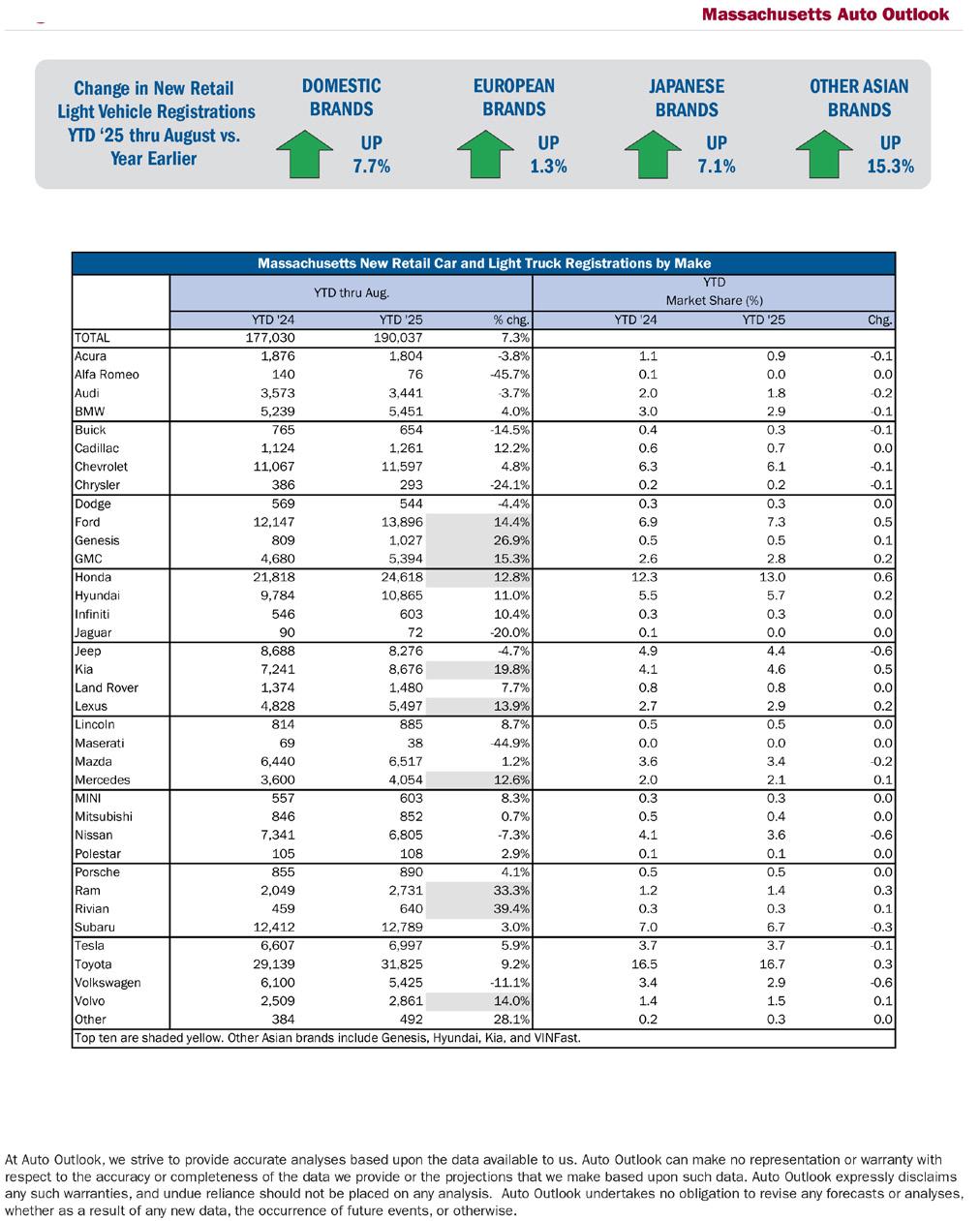


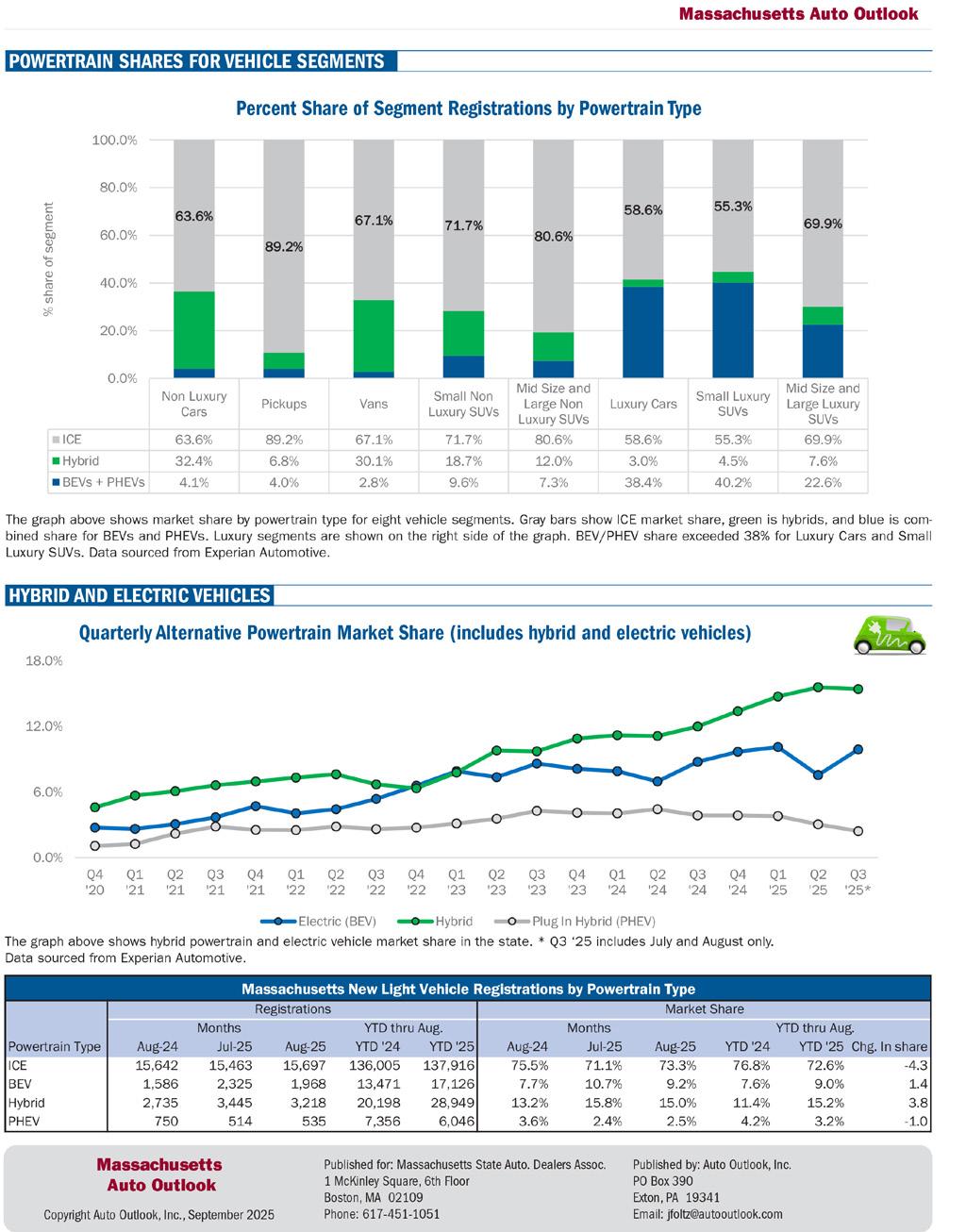
Members of Congress,” Dube stated. “There is no more impactful activity than direct interaction with lawmakers to explain the effects of their actions on Main Street businesses.”
“Depending on who controls the legislative chambers, policy shifts can change 180 degrees every two years. As almost half our House members hold leadership positions of some heft at some time, it is vital we keep our industry issues in their minds as they contemplate certain policies that can impact our business operations, employees, and customers,” Dube continued. “Afterall, the 427 Massachusetts dealerships employ over 25,000 men and women across the state, serving millions of sales and repair customers each year, and we are all constituents.”
NADA kicked off the conference with the sole focus on Next Gen dealers, beginning with an evening reception on Monday, September 8, followed by a full slate of speakers and policy briefings on Tuesday morning, which focused on getting young, new attendees up-to-speed on NADA’s legislative priorities. After NADA’s legislative affairs team instructed the group of NextGen dealers on how to be successful advocates for the retail auto and truck industry, they put their new skills to the test by attending Congressional meetings on Capitol Hill along with their state dealer colleagues.
NADA, as part of the festivities, always does an excellent job bringing in speakers to provide a full flavor of what is going on in the extremely insular world of D.C. politics. This year’s crop of speakers included Rep. Brett Guthrie (R-Kentucky), the chair of the House Energy and Commerce Committee; Sen. Elissa Slotkin (D-Michigan), who voted yes on the Congressional Review Act resolution to overturn California’s Advanced Clean Cars II approval from the EPA in June; and Andrew Ferguson, Chairman of the Federal Trade Commission.
The key issues dealers focused on this year were overturning the EPA’s new emission rules for cars and light-duty trucks with their de facto EV mandate; supporting passage of a bill to address catalytic converter thefts; and opposing so-called “right to repair” legislation.
(D-South Boston), Katherine Clark (D-Revere), and Seth Moulton (D-Salem).
This was Vincent Masstria’s second year for the conference. “I had the privilege of representing Massachusetts Auto Dealers at the Washington Conference, where we addressed critical issues like EV mandates, catalytic converter theft, and the proposed right to repair law. By attending the conference, I realize just how vital our voice is in shaping policies,” Mastria said. “Dealers
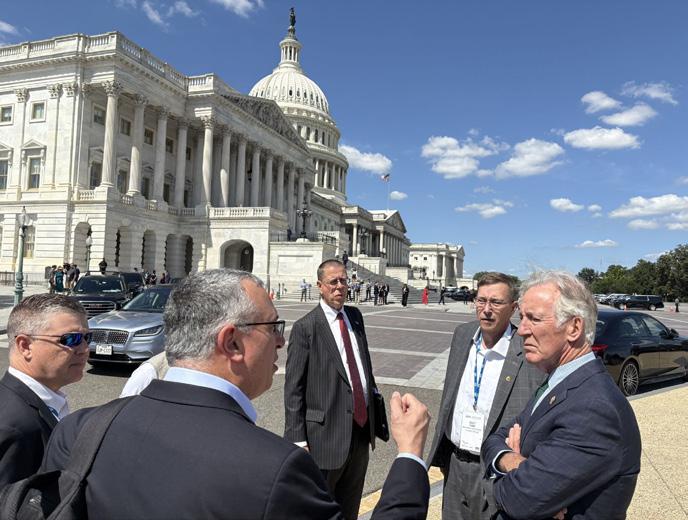
The key issues dealers focused on this year were overturning the EPA’s new emission rules for cars and light-duty trucks with their de factor EV mandate; supporting passage of a bill to address catalytic converter thefts; and opposing so-called “right to repair” legislation.
Once the speeches and briefings were over, dealers were ready to spread the message on Capitol Hill. During MSADA’s two days of meetings in D.C., they met with Reps. Jake Auchincloss (D-Newton) and Richard Neal (D-Springfield), and staff members for Reps. Lori Trahan (D-Westford), William Keating (D-Bourne), Jim McGovern (D-Worcester), Stephen Lynch
from not only our state but from across the entire country came together, because these challenges resonate nationwide. It’s vital that we remain engaged in these conversations to help shape the future of our industry, represent our employees and customers, and protect our communities and brands we serve.”
Mike Sullivan, Director of Governmental Affairs and Corporate Partnerships for Group One Automotive, which has dealerships in
four of the state’s nine Congressional districts, joined Team Massachusetts for the Hill meetings. “Our meetings with Members of Congress from Massachusetts were productive on all fronts. Bob O’Koniewski’s reputation in the halls of Congress makes it easier for franchise dealers to tell their stories and explain how legislation, both good and bad, impacts our businesses and their constituents,” Sullivan said. “It is always productive to try to find some grounds of agreement between our industry interests and our elected officials. I feel our efforts helped in that regard.”
We are in the first year of the second term of a Trump administration, which is operating with Republican control in both the House and Senate. There is a sense of urgency, however, that the GOP needs to deliver results relatively quickly as next year’s focus will all be on the November mid-term elections. With exceedingly tight margins in the House and Senate, Democrats will look to take over the chambers.
As Americans begin to feel the impact of the Trump and Republican Congressional policies on the economy, immigration, and foreign affairs leading into next year’s elections, those in dealer world cannot rest – NADA, MSADA, and other state dealer associations must remain on top of the activities in Washington.
“A substantial part of what MSADA does for our members is
to stay in touch with our U.S. senators and representatives so that they know that what they are doing, or not doing, has an impact back home at our members’ dealerships,” said MSADA Executive Vice President Robert O’Koniewski. “We can never stop putting effort into making sure our representatives know who we are, what we do, and how vital our contribution is to their districts and our communities. Our engagement cannot be sporadic. Building relationships through constant communications can help to move policies in certain directions at times. Vigilance, education, and dealers’ active participation are pillars in our lobbying efforts throughout the year.”
First-time attendee Adam Silverleib of the Silko Auto Group summed it up accurately for all dealers who were there. “This was my first experience lobbying at the Capitol in support of our industry on matters than can impact our futures, talking to my Congressman at his place of work. This event highlights why it’s so important for dealers to get involved and tell their stories. Participating in the event made me realize just how vital our voice is in shaping policies. If we don’t tell our story, then either someone else will, most likely incorrectly, or it won’t be told at all. I look forward to keeping at it for the long haul.”
As government becomes more involved in the auto industry,
“We can never stop putting effort into making what we do, and how vital our contribution Our engagement cannot be sporadic. Building relationships can help to move policies
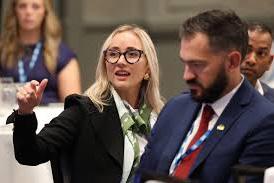


the future of dealers’ advocacy is in good hands with Massachusetts’s dealer leaders stepping up to answer the bell each year.
Here is a recap of the three main issues we discussed with our Members of Congress:
Issue: The Biden Administration finalized its electric vehicle (EV) mandate that would effectively require up to 56% of U.S. vehicle sales to be electric by 2032. While dealers have made significant EV investments, the public charging infrastructure is not ready, and high EV prices have priced out millions of consumers, particularly low-income Americans, from the new-car market. NADA supports H.R. 2814 and S. 711, bills which would repeal the EPA’s EV mandate and require new fuel economy/ greenhouse gas standards that are economically practicable and technologically feasible.
Background: In 2024, the Biden Administration’s EPA finalized its “Multi-Pollutant Emissions Standards for Light-Duty and Medium-Duty Vehicles for MY 2027 and Later” rule that would effectively mandate 26% in 2027, 44% in 2030, and 56% of new vehicles sold in 2032 to be EVs. Currently EVs are only 7.3% of the new car market, despite federal tax credits which will be
phased out by September 30 of this year. EPA projects that this rule will reduce the availability of gas vehicles (including hybrids and plug-in hybrids), now 92.7% of the market, to 29% by 2032.
While dealers have promoted electrification of America’s fleet with billions of dollars of their own capital committed to investments in facilities, training, and inventory, the Biden EV mandates ignore current real-world consumer demand for EVs. Demand has been sluggish because: (1) the average transaction price for an EV is almost $8,000 more than a gas car; (2) current charging infrastructure is inadequate along with long charging times; and (3) gasoline prices average around $3 a gallon.
On July 29, the Trump administration proposed a new rule that would eliminate the EPA’s ability to regulate greenhouse gasses from vehicles, which was the basis for the Biden-era EV mandate. If the rule is finalized, Biden-era EPA greenhouse gas rules will be revoked. NADA supports legislation that would prevent the EPA mandates from going into effect while the proposed rule is being finalized.
The “Transportation Freedom Act” (H.R. 2814/S. 711) would restore consumer choice and Congressional authority over fuel economy/greenhouse gas standards by providing one national standard and long-term regulatory certainty for the auto industry.
making sure our representatives know who we are, contribution is to their districts and our communities. relationships through constant communications policies in certain directions.”
O’Koniewski
Executive Vice President

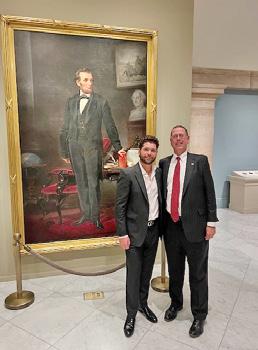

It repeals the EPA’s EV mandate that 56% of all new cars be EVs by 2032. It also mandates a 180-day window for EPA to replace the standards with tough but achievable standards for 2027-2035.
NADA also supports a provision (Sec. 458) that would stop EPA’s EV mandate until September 30, 2026, that was included in the FY2026 House Interior, Environment appropriations bill.
Key Points: The Biden Administration’s overly aggressive EV mandate ignores real world consumer demand. Many consumers are not ready to transition to EVs because they cost more than gas cars, and a sufficient, reliable charging infrastructure does not yet exist. The current EV policy will significantly hurt rural America and lower-income buyers who cannot afford or conveniently charge EVs.
Passing the “Transportation Freedom Act” would result in a new vehicle market that is more affordable and help consumers buy a new car that meets their budget and transportation needs. The legislation would make sure fuel economy/greenhouse gas standards are based on real-world feasibility and affordability.
H.R. 2814 and S. 711 would restore Congressional authority over fuel economy/greenhouse gas standards and ensure regulatory predictability and stability for the next ten years. The aggressive Biden EV mandates were not set by Congress. Legislation is needed to restore a uniform, national fuel economy standard set by Congress.
Status: Members are urged to cosponsor H.R. 2814 and S. 711, introduced by Rep. Troy Balderson (R-Ohio) and Sen. Bernie Moreno (R-Ohio), respectively, which would repeal the EPA’s EV mandate and set one national standard.
Issue: Catalytic converters are attractive targets for thieves due to their precious metals, such as rhodium, platinum and palladium. Criminals can easily steal catalytic converters from unattended vehicles. Since catalytic converters are not readily traceable, there is a lucrative market for these stolen parts. These thefts are costing millions of dollars to businesses and individual vehicle owners alike and continue to be a significant problem. Members of Congress should cosponsor the “Preventing Auto Recycling Theft Act” (H.R. 5221 and S. 2238), which would help law enforcement combat catalytic converter theft by marking catalytic converters and creating a more transparent market that deters their theft.
Background: As required by the Clean Air Act, catalytic converters reduce toxic emissions from internal combustion engine vehicles using precious metals to remove toxic elements from the exhaust gases. The price of these precious metals rose sharply during the pandemic, contributing to a sharp increase in theft. Stolen catalytic converters can garner anywhere from $20 to $350 on the black market, with the replacement cost to vehicle owners averaging over $2,500. Stolen catalytic converters are difficult to trace since they lack identification numbers tied
to the vehicle, which hampers law enforcement from proving ownership and prosecuting theft.
Thefts have also turned violent, with high-profile tragedies underscoring the urgency of addressing this issue. While several states, such as Minnesota and North Carolina, have enacted laws to address the issue, this crime frequently involves trafficking stolen parts across state lines and a federal framework is needed to aid the efforts of local law enforcement.
The PART Act addresses this crime by: (1) requiring new vehicles to have unique identifying numbers, a VIN or other traceable number, stamped on catalytic converters at the time of assembly; (2) establishing a $7 million grant program to mark catalytic converters of vehicles already on the road at no cost to vehicle owners; (3) increasing record keeping requirements for purchasers; and (4) establishing a federal criminal penalty for the theft, sale, trafficking or known purchase of stolen catalytic converters of up to five years.
Key Points: Catalytic converter theft skyrocketed after the pandemic due to the precious metals contained in each device. The PART Act would provide law enforcement the tools to trace stolen catalytic converters back to their source. Catalytic converters are not one of the 18 vehicle parts required to be marked with a VIN or number traceable to a VIN. Law enforcement has

stated that including such tracing in the legislation is critical to help deter the theft and trafficking of stolen catalytic converters since it would make it easier to prosecute criminals.
The PART Act provides a national framework to help law enforcement combat catalytic converter theft. Since this crime frequently involves trafficking stolen parts across state lines, a federal standard is needed to help law enforcement.
Status: The PART Act (S. 2238) was reintroduced by Sens. Amy Klobuchar (D-Minnesota) and Bernie Moreno (R-Ohio) in the Senate, and Reps. Jim Baird (R-Indiana) and Betty McCollum (D-Minnesota) introduced companion legislation in the House. NADA and 119 other organizations sent a letter to Congress supporting passage of the PART Act last year. This Congress, the bill includes some non-controversial revisions to improve clarity and enhance enforcement. Members are urged
to cosponsor the PART Act to help curb the growing national problem of catalytic converter theft protect consumers, and free up valuable time for law enforcement organizations across the country. Thus far, Cong. Lori Trahan (D-Westford) has co-sponsored the House bill.
Issue: Advocates for “right to repair” legislation claim that independent automotive repair shops do not have access to the parts or data necessary to repair vehicles. However, this concern was rectified by a 2014 Memorandum of Understanding, signed by “right to repair” proponents and auto manufacturers, and reaffirmed by a 2023 industry commitment that includes telematics. Today, the information independent shops need to repair vehicles is readily available from every auto and truck manufacturer.
H.R. 1566 and S. 1379 have little to do with repairing a vehicle; instead, the bills would allow vehicle owners to give all technical and compatibility information, software, and technology to any third party they designate “without restriction or limitation.” This bill regulates only vehicles and does not apply to other products, such as farm equipment or mobile phones. Members of Congress should oppose H.R. 1566 and S. 1379, which is redundant in nature and creates an unlevel playing field for small business dealers.
Background: Instead of increasing competition in the service market, H.R. 1566 and S. 1379 would reduce competition and consumer choice. Dealerships currently service multiple brands, including those outside their franchise. However, this legislation may exclude franchised dealers from receiving so-called “necessary” vehicle-generated data that would be needed for repairs. For example, a franchised GM dealer may be barred from receiving the repair information necessary from any other automaker to repair vehicles outside of their brand. This could put dealers at a competitive disadvantage and limit where customers can take their vehicle for repairs leading to fewer service options.
Congress should also consider whether this bill is necessary to ensure “right to repair” as automakers and independent repairers already have a longstanding formal mechanism through the National Automotive Service Task Force to ensure service information, tool information and training data is made available from every truck and auto manufacturer.
Despite this effective dispute resolution mechanism, the bills would unnecessarily expand the powers of federal agencies. The legislation would empower the Federal Trade Commission (FTC) to expand the definitions included in the bill at their own discretion. Additionally, the bill requires the FTC to “promulgate regulations” requiring additional paperwork for customers at the point of purchase when dealers are trying to streamline and shorten the purchasing process. Failure to comply with this new requirement could result in up to a $51,744 fine per violation. This regulation would not apply to independent dealers or direct sellers, further creating an unlevel playing field.
Key Points: The legislation provides an unfair competitive
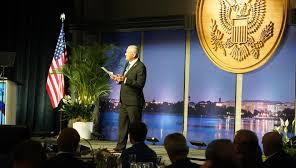
market since dealers annually invest significant amounts of capital into their service and repair capabilities, first rate technician training and state of the art diagnostic and repair tools to provide safe repairs. Under their franchise sales and service agreements, dealers invest on average $334,000 annually on machinery and shop equipment and $82,000 annually on technician training to keep up with the latest technology to repair vehicles safely and securely.
Dealers must meet significant regulatory requirements under the FTC Safeguards Rule and FTC Act to be able to safely and securely handle customers’ vehicle data. Technological requirements under the FTC Safeguards Rule alone are significant, with an average small dealership having an initial $220,000 cost and a $218,000 annual cost to comply. While in both House and Senate REPAIR bills repair information must be subject to the “same technological protections” it remains unclear what in practicality that means and if ‘any third party’ will have to meet the same data privacy and security regulatory safeguards that dealers do to handle their customers’ vehicle data.
A Government Accountability Office (GAO) report confirms the information and tools necessary to repair vehicles are already available to independent repair shops. The report found that of the eight automakers GAO interviewed, all confirmed that “they provide to independent repair shops, on fair and reasonable conditions, equal access to the information, data, and tools needed for repairs, and will continue to do so.” Independent repair shops currently perform more than 70% of all non-warranty repairs, and according to the Auto Care Association, which supports this legislation, their total revenue grew 43% from 2014-2022.
Status: Rep. Neal Dunn (R-Florida) reintroduced H.R. 1566 in February, and Sens. Ben Lujan (D-New Mexico) and Josh Hawley (R-Missouri) introduced S. 1379 in April. Last Congress, NADA and industry stakeholders submitted a coalition letter opposing this flawed legislation. Members of Congress are urged not to cosponsor H.R. 1566 or S. 1379. Thus far, no Massachusetts House or Senate member has co-sponsored the bill.

By Erika Gagne
CPA, Albin Randall & Bennett
In recent years, dealerships have embraced phone and online sales to streamline transactions and expand their market, but this convenience has also opened the door to new, costly scams. Sophisticated fraudsters now exploit remote purchase and shipping processes with counterfeit cashier’s checks and synthetic identities, leaving dealers liable for vehicles and funds. Financial losses can quickly escalate into tens of thousands of dollars per incident, undermining both cash flow and customer trust.
Here, we will explore the root causes of remote-sale fraud and outline practical strategies for rigorous buyer verification, centralized fund-clearing, targeted staff training, smart technology implementation, and rapid response protocols, thereby arming your dealership with the defenses it needs to safeguard its inventory and reputation.
At the core of these attacks lies a misplaced confidence in speed and convenience. Cashier’s checks remain more trustworthy than personal checks, but fraudsters know dealers tend to release vehicles as soon as funds post. Because banks must make these deposits available quickly, even if they take a week or more to authenticate fully, scammers press for immediate delivery.
Synthetic-identity tactics make the threat more complex: criminals stitch real Social Security numbers together with fictitious names, addresses, and employment records. Initial credit and identity checks pass, financing is approved, and the deception only surfaces when payments bounce
and the buyer vanishes.
To guard against these evolving vulnerabilities, dealerships must bolster their remote-sale protocols with robust verification and oversight measures.
The first line of defense is rigorous buyer authentication. Treat every phone or online sale with the same scrutiny reserved for high-value in-person transactions. Require multiple forms of ID, run credit reports on cashier-check deals, and verify contact information independently by looking up issuing banks through official directories rather than relying on buyer-supplied details. Third-party databases can confirm employment and residence, adding another layer of assurance. While these steps may add a day or two to the process, they transform a potential loss into a secure sale.
Behind the scenes, establishing clear, centralized approval processes prevents a single employee’s eagerness from undermining your safeguards. Instituting mandatory hold periods on funds from out-ofstate sales or third-party shipping transactions allows time for full authentication.
Dealership-management systems can flag any remote sale above a dollar threshold or any order requiring external carriers. Routing high-risk payments through a verification team ensures that no vehicle is released without proper managerial sign-off.
Staff training ties every element together. Every employee—from showroom hosts to logistics coordinators—must recognize red flags: unusually large or bulk purchases, last-minute shipping instructions, reluctance to meet in person, or communications that avoid direct contact. Conduct regular workshops using real-world examples and role-playing exercises so team members learn to pause and escalate concerns.
By encouraging a culture that rewards vigilance over speed, you turn employees into active protectors of your bottom line.
Rapid Response and Collaboration
Even the best defenses cannot guaran-
tee zero fraud attempts. When a suspect transaction arises, swift, coordinated action can limit damage. At the first hint of trouble, senior management should convene to assess exposure. If the vehicle remains on your premises, instruct the carrier to halt or intercept shipment immediately. If goods are already en route, file an insurance claim and contact your bank to reverse the deposited funds before they are clawed back without warning. Preserve all records—emails, phone logs, check copies, and carrier receipts—to support disputes and investigations.
Sharing intelligence with peers strengthens the entire dealer network. Report incidents to your state association or local trade group, supplying sample check numbers, fraudster contact details, and excerpts from communications. Associations can distribute bulletins that alert other dealerships to emerging schemes, making it harder for criminals to succeed elsewhere. Filing comprehensive reports with law enforcement and, when appropriate, federal authorities gives investigators the best chance to dismantle fraud rings rather than chase lone actors.
The Road Ahead
Remote sales offer undeniable benefits, such as meeting customer demands for convenience and contactless service. However, those advantages carry heightened risk. Dealerships that integrate fraud prevention into their customer-service ethos will protect both their bottom line and their reputation. By combining rigorous buyer verification, centralized fund-clearing processes, ongoing staff education, and targeted technology tools, you can enjoy the speed and flexibility the market demands without exposing yourself to crippling fraud.
In an environment where every transaction carries potential risk, taking the necessary time to confirm identity, funding, and intent is the surest investment in your dealership’s future.


“Merchant Advocate found a costly error—our software was not passing along all the necessary information—and worked directly with our provider to resolve the issue. We’ve already saved more than $70,000 as a result. I recommend having Merchant Advocate look at your account.”
–Denise Devoe, Corporate Controller

“Not only did Merchant Advocate uncover a significant optimization opportunity, but they also helped us replace 100 out-of-date terminals—for free! We are looking forward to more than $60,000 in savings in our first year. Merchant Advocate took care of everything—the process couldn’t have been any easier for us.”
–Jeb Balise, President

“Within the first two months of working with Merchant Advocate, we’ve saved over $4K in credit card fees across our 9 Merchant IDs! I wholeheartedly endorse Merchant Advocate for any business seeking to optimize their payment processing costs and enhance their financial health. Their vigilant monthly oversight of our statements ensures that we are not subjected to the pitfalls of an unregulated industry.”
–Joe
Bonofiglio,
C o r p o r a te C o nt r o l l e r

There are over 1,500 attorneys in the United State who focus on legal actions against car dealers.
Who reviews your F&I documents for legal or regulatory changes?
What if your dealership had access to a complete suite of documents needed in F&I?

Only the LAW F&I Library™ provides:
A complete set of state-specific F&I documents in both pre-printed and electronic formats.
An industry leading team of in-house and outside legal resources reviewing forms for legally required and best practice updates.
A trained team of compliance consultants who can work with you to manage your compliance risks.
By Attorneys Tom Vangel, Jamie Radke, and Lindsey McComber, Harris Beach Murtha Cullina PLLC
The California New Car Dealers Association (CNCDA) recently brought suit against Sony Honda Mobility of America, Sony Honda Mobility, Inc., and American Honda Motor Co., Inc. alleging violations of California state franchise laws over their plan to use the Sony Honda affiliate brand to sell directly to consumers.
Sony Honda is a joint project between Sony and Honda intended for the “sale of high-value-added electric vehicles (EVs).” With this collaboration, Sony Honda has developed its first EV, the Afeela 1, which is currently being built in Honda’s factory in Ohio. The Afeela 1 is set to begin deliveries in Spring 2026.
Sony Honda and its partners have already begun soliciting and accepting $200 deposits directly from California consumers without the use of existing Honda and Acura dealers in California. With the deposits, consumers are to enter into a Reservation Agreement which provides that they are “reserving a future purchase of [the] selected Afeela EV.” Under Sony Honda’s scheme, an Afeela vehicle cannot be sold to a consumer without them entering into the Reservation Agreement and paying the $200 deposit directly to Sony Honda.
Given the direct solicitation of deposits from California residents without the use of Honda, Acura, or other interested dealers, the CNCDA has sued alleging that Sony Honda is acting in direct violation of California law. The statute prohibits auto manufacturers from using affiliated brands to compete with their franchised dealers. This law allows franchisors to create and use affiliate brands but requires that the affiliated brands use new or existing franchisees to sell their vehicles.
The CNCDA’s complaint alleges unfair competition and false advertising, and it seeks declaratory relief to stop direct-to-consumer sales of Afeela-brand vehicles. The Afeela-brand vehicles are
being positioned as standalone EVs. The CNCDA alleges that the Reservation Agreements are currently impacting sales for California dealers because consumers expect that they will receive the Afeela vehicles directly from Sony Honda. Therefore, the CNCDA alleges that Sony Honda is competing directly with existing Honda and Acura dealers. It also alleges that dealers in California feel that Sony Honda’s direct-to-consumer model unfairly undermines dealer investments in violation of California law.
The lawsuit against Sony Honda is similar to actions filed in Florida and California against Scout Motors for its plan to sell its new EVs directly to consumers. Like the claims made against Sony Honda, dealership groups argued that VW is unlawfully trying to undercut the investments made by VW dealers in violation of state franchise laws. Scout Motors has maintained that it is a new, independently managed company separate from VW but has faced many challenges to this assertion given its direct affiliation with VW with its relaunch and its prior acquisition by VW.
The Scout Motors lawsuits are still in the early stages of litigation, but, in July, Scout Motors Vice President of Government and Regulatory Affairs wrote to the U.S. Department of Justice Anticompetitive Regulations Task Force to urge it to eliminate state motor vehicle franchise laws. In his letter, he argues that state motor vehicle franchise laws are anti-competitive and do not reward bold innovation. He asserts that these laws have “mutated into legal shields for established franchise dealership networks, barring any other business model from existing, let alone competing with these networks.”
The Department of Justice has not yet issued an official response to the letter. However, even with the recent formation
of the Anticompetitive Regulations Task Force under the Department of Justice, franchise laws are primarily state-level regulations which the DOJ would not have the authority to rule over.
Although these disputes allege violations of California and Florida state franchise laws, the outcomes of these cases could have far-reaching consequences for automobile dealers across the country and in Massachusetts. Like California, Massachusetts law also prevents manufacturers from selling directly to consumers. Under Chapter 93B, §4(c)(10), of the Massachusetts General Laws, manufacturers are prevented from owning or operating “either directly or indirectly through any subsidiary, parent company or firm, a motor vehicle dealership located in the commonwealth of the same line make as any of the vehicles manufactured, assembled or distributed by the manufacturer or distributor.” Further, Chapter 93B, §15 gives dealers who suffer from an unfair method of competition or deceptive act or practice at the hands of a manufacturer standing to bring an action for damages and equitable relief.
Massachusetts dealers should closely monitor these cases as they could provide some insight into how a Massachusetts court or legislature may respond to a manufacturer attempting to sell directly to consumers in Massachusetts. They also serve as an important reminder that dealers need to vigorously assert their rights as manufacturers attempt to marginalize their role in the sale and servicing of motor vehicles.
Tom Vangel and Jamie Radke are partners and Lindsey McComber is an associate with the law firm of Harris Beach Murtha Cullina PLLC in Boston who specialize in automotive law. They can be reached at (617) 457-4072.

Michele D’Antonio
In today’s increasingly regulated dealership landscape, keeping your deal paperwork in check is not just good practice, it is non-negotiable. With compliance standards tightening and fines growing steeper, every dealership needs an airtight strategy for managing deal jackets. That strategy starts with one surprisingly powerful tool: a checklist.
What Is a Deal Jacket—And Why It Matters: A deal jacket is the complete set of paperwork tied to a vehicle transaction. It includes everything from personal customer info and signed agreements to compliance disclosures, finance records, trade-in documentation, and DMV materials. When even one item is missing, delayed, or improperly signed, the impact is immediate and potentially costly.
The Power of a Checklist: A wellstructured deal jacket checklist reduces human error, accelerates deal delivery, and protects your dealership from compliance slip-ups. Here is how it transforms your process:
• Ensures every necessary document is collected and executed;
• Speeds up funding and registration by eliminating guesswork;
• Keeps teams accountable and organized across departments and rooftops;
• Enhances customer satisfaction with faster, smoother experiences.
Standardize to Customize: For dealer groups with multiple brands or locations, uniformity is key. That does not mean one-size-fits-all. It means building a core checklist that can flex for franchise-specific or state-specific documentation. Sign-off fields at each stage allow staff to verify completeness and accuracy, ensuring nothing falls through the cracks.
The Hidden Cost of Missing Pieces: Sales might be solid, but deals can unravel after delivery if the paperwork is not in order. Missing documents can delay funding, stall registration, and frustrate customers—all while opening the door to regulatory penalties. Each error adds risk, and, over time, risk erodes revenue.


Exceed Expectations—Not Just Meet Them: Integrating a deal jacket checklist into your daily operations makes every transaction smoother and every team member sharper. You do not just protect your business from fines; you elevate performance.

Deal Worksheet/Recap
Billing Invoice
Cash Receipts



Signed Buyers Order – Detailing All Aspects of the Deal and Vehicle

F&I Products have Signed Documents for Each Item
F&I Declined Products
Monroney Label/ Factory Invoice
OFAC was Run
Accessories and Options have Signed Documentation
We Owe is Signed
PDI Completion Paperwork

Prior Used Form as well as Related Notation on Buyers Order, Finance Contract etc.
Damage Disclosure (As Needed)
Signed Recission Agreement for All SPOT Deals
Rebate Forms and Vehicle Eligibility Forms
RDR/NVDR Reporting Forms
Insurance Verification (NY - Binder)
Temporary Plate/Registration
Power of Attorney is Signed and Complete
Valid Driver’s License
Copy of MSO or Title for Used Vehicle
Signed Odometer
DMV receipts and Supporting Documentation
Sales Tax Calculation (ST-3 (Resale), ST-10 (Tax-Exempt), ST-40 (Leases) When Applicable)
Fuel + Efficiency Tax Worksheet
Consumer Credit Report and Signed Application
Financed Deal Deals
Finance Source Approval, Denial and Stipulations
Executed Finance Contract
Lease Waiver Signed
Executed Lease Agreement
Lease Worksheet that Matches Buyers Order
Executed Privacy Notice
Executed Lemon Law
Executed Do Not Call
Executed Opt-Out Notice for Third-Party Contacts
Warranty Limited Disclosure
Buyer’s Guide Enclosed
Odometer Statement - Complete and Executed
Appraisal - Completed and Executed
Trade Title or Completed Authorization for Payoff
Title and Repair Search (Carfax)








Choosing a local dealership broker with a lifetime of experience in the Northeast is your best bet. We will sell your dealership(s) for maximum value. We will sell you a store hassle-free with honesty and integrity. We have the BEST reputation in the Northeast, bar none! We have sold more stores here in the past 45 years than any other broker. National brokers cannot offer you that hands on experience here! To us, you aren’t just another number. Our focus is on your needs. Our mission is to provide the highest level of service to our clients by achieving results in a timely, professional, confident manner.
➥ We have a long term, very close, productive working relationship with VADA dealer members.
➥ Highest level of integrity and Buyer and Seller loyalty
➥ Our clients now include the FOURTH Generation of our original clients
➥ Highest volume of brokered dealership transactions in New England bar none
➥ We are the most experienced brokers
➥ Deals get done using brokers not lawyers or accountants to negotiate the best deals for clients
➥ We are local
➥ No alien broker can compete
➥ No one knows this market better than Gordon Wisbach over 4 decades A preferred broker in New England for 45 years

Contact Gordon Wisbach for


By Chris Cahill Partner, Twelve Points Business Advisors
As advisors focused on the auto retail industry, we see the same pattern over and over: a dealership has a buy-sell agreement or “succession plan” that looked fine years ago—until life happens.
In auto retail, succession is not just a family or shareholder matter; it is wrapped in franchise law, OEM approval, lender covenants, related real estate and reinsurance entities, and state tax/estate rules. If your agreement is outdated or you do not have one, you are exposed to avoidable risks when the “Five Ds” strike: death, disability, divorce, deadlock/disagreement, and departure (including disqualification by the OEM). When we help dealers navigate succession, our guidance is straightforward; treat it as an ongoing business-critical discipline, not a one-time event.
Unfortunately, too many owners treat succession planning as a one-and-done sort of thing. While you may think that an old plan is better than no plan, that may not, in fact, be the case. We have seen many instances where the terms of an old succession plan or changes in circumstances create more issues for the parties than you could ever imagine. That is why it is critical to not only make sure that you have a great succession plan now, but that you continue to review it and update it on an ongoing basis. Ideally, the company should build it into their early operations review.
We will touch on some of those reasons below and will illustrate why you really do need to review and update your current
plan or implement your first succession plan now.
Unlike other private companies, your transition has a factory overlay. Most franchise agreements require OEM approval of any new owner or operator, and many give the manufacturer a right of first refusal (ROFR) to step into (or reassign) a transaction. Several states also dictate succession rights for heirs or designated successors, often with strict notice and qualification timelines. If your plan does not match your specific OEM agreement and your state’s franchise law, your family and partners can face delays, added costs, or even a substituted buyer.
Death. If a dealer-owner dies without a current buy-sell and designated successor package, the estate may need probate court authority before anyone can sign factory, bank, or real estate documents, which can stall payroll, floorplan, and CSI-critical decisions. Many states require franchisors to honor a properly designated successor who timely notifies the OEM and meets reasonable standards. The clock, however, starts immediately, and documentation must be right. A plan that names a successor operator, aligns governance across all entities, and pre-packages OEM materials is essential.
Disability. Long-term disability is more common than most owners think (SSA estimates about 1 in 4 workers will become disabled before retirement age). Yet many agreements either define disability vaguely or lack funding for a disability buyout, leaving the business to carry a non-participating owner indefinitely. Well-drafted documents define when disability triggers a buyout and how it is funded, often with
disability buy-out insurance (distinct from key-person coverage) to provide liquidity without starving operations. You should review definitions, elimination periods, and funding amounts regularly.
Divorce. Without tight transfer restrictions and spousal consents, a divorcing owner’s shares (or economic rights) can land with a non-approved spouse, creating control and OEM-approval problems. Modern agreements address divorce explicitly, requiring a company/owner right (or obligation) to purchase the interest at a defined price and prohibiting transfers to non-approved parties. These terms protect continuity and also minimize valuation disputes in family court.
Deadlock/Disagreement. Many multiowner dealerships operate on trust until a serious disagreement over reinvestment, add-points, or successor leadership freezes decision-making. Courts can appoint custodians or receivers or even order dissolution for deadlocked close corporations— an outcome no dealer wants. Agreements should hard-wire deadlock-breaking mechanisms (e.g., independent board member, put/call, baseball arbitration) so disputes resolve privately and quickly.
Departure/Disqualification. Retirement, loss of operator qualification, or an OEM’s objection can derail internal transitions if your plan does not contemplate who can run the store and meet working-capital, experience, and training standards. Several OEMs and state laws prescribe procedures and timelines for successor approval; plans should map these steps, including notice requirements, temporary operators, and backup funding if the primary plan stalls.
Stale valuation clauses. Fixed-price or outdated formulas (e.g., book value or old multiple) can vastly under- or over-state value, igniting family or partner disputes.

Periodically refresh your valuation method (tri-appraisal or current, well-defined formula) and sync it with funding. This is a critical step in the review process!
Insurance mismatches. Coverage amounts that were adequate years ago may not cover today’s blue-sky, real estate equity, or reinsurance stacks. Life/disability funding should be tested against current enterprise value, then reviewed annually. Industry data also shows persistent coverage gaps among business owners.
Entity misalignment. Many groups operate a dealership entity alongside a real estate LLC and F&I reinsurance company. If buy-sell triggers, valuation, and funding are not coordinated across all entities and leases, you cannot close cleanly or keep lenders and the factory comfortable. (Dealership CPAs emphasize aligning agreements across the entire enterprise.)
What a Dealership-Specific BuySell/Succession Update Should Include
• OEM-aware design. Identify the des-
ignated successor operator, confirm eligibility with the OEM, and build a ROFR game plan. Capture state-specific succession rights and statutory timelines inside your closing checklist.
• Clear triggers and funding. Define death, permanent disability (with time frames), divorce, voluntary retirement, and loss of qualification. Pair each trigger with how the buyout is funded (life and disability buy-out policies, installment notes, or bank facilities).
• Modern valuation. Replace fixed numbers with a tested formula or appraisal process designed for auto retail and revisit it regularly.
• Governance and deadlock relief. Add dispute-resolution and deadlock mechanisms to avoid court intervention.
• Enterprise coordination. Mirror triggers, valuation, and funding across the dealership, real estate, and reinsurance entities; update leases and dividend policies accordingly.
• Estate plan integration. Ensure trusts, spousal consents, and beneficiary desig-
nations match ownership restrictions so transfers do not violate OEM or shareholder rules. (Trade associations and bar groups consistently flag this coordination step for dealers.)
For auto dealers, “we already have a buy-sell” is not the same as “we are properly protected”. State laws, OEM policies, valuations, family situations, and health all change, and the stakes are higher when a franchise, floorplan, and hundreds of jobs depend on continuity. A dealership-specific update that anticipates the Five Ds, aligns with your OEM and state law, and is properly funded and coordinated across entities is the surest way to protect your family, your partners, and your store.
If you would like, we can run a rapid Buy-Sell Health Check—reviewing triggers, valuation, funding, OEM alignment, and state-law succession rights—so you know exactly where you stand and what to fix first.

“Fine.”
By Justin DeRocco Northeast Regional Sales Manager, DealerPay
That is the word many dealership leaders use when describing their payment systems. It works. It’s fine.
But “fine” in payments is rarely fine. It is usually where margin quietly disappears. And with year-end planning underway, now is the time when every dollar counts.
Payments are often treated like a commodity — a back-office function to process transactions, not a lever that protects margin. But payments touch every dollar, every department, and every customer interaction.
For CFOs, this blind spot is costly. They scrutinize cost of goods sold, personnel expenses, and OEM programs with precision, but payments, which can rank as the third-largest dealership expense, are often accepted without question. That quiet acceptance creates exposure.
The real challenge is not just the fee on the statement; it is the way costs multiply and hide in plain sight.
First, there are the charges that appear right on your monthly bill, random fees with vague explanations that keep getting paid simply because no one has the time to question them. These fees are often presented in ways that vary month to month, making them hard to track, almost as if they are designed to confuse. It happens more often than most dealers realize.
Then there is the bigger question: why are there so many fees in the first place? From interchange markups to miscoded transactions, complexity creates cover for costs that slip past unnoticed. Dealers see the bill, but rarely the breakdown, and that lack of visibility adds up to real dollars lost.
And finally, there are the costs that never show up on a statement at all: the customer who walks away after a clunky checkout, the CSI score that drops, the advisor who loses confidence in the process. These are harder to measure, but they erode margin just the same.
Together, these layers of hidden costs drain dealerships of profitability. They
Dealerships that continue to treat payments as a commodity will keep absorbing hidden costs. Dealerships that treat payments as strategy will recover and protect margin others are losing.
inflate expenses, consume staff time, increase compliance risk, and damage customer relationships. And they do it silently.
Calling a payment system “fine” is like calling a leaky roof “good enough.” It might not collapse today, but it is costing you every day.
“Fine” means visible fees go unchallenged.
“Fine” means staff time gets wasted on manual reconciliation.
“Fine” means compliance is left to chance.
And “Fine” means customers leave with the wrong last impression.
The cost of staying the same is almost always higher than the cost of change.
“If we can help dealers think differently about payments processing, and bring them new ideas that challenge change, then we have earned the right to have a relationship.”
Every dealership leader — CFOs, controllers, general managers, fixed ops directors — shares responsibility for protecting margin. Yet payments are still too often treated as a box to check. That mindset belongs in the past.
Payments should be viewed as a strategic lever: a protector of margin through visibility and control, a safeguard for compliance when rules are built into the process, and a driver of customer experience when checkout is fast, seamless, and flexible.
Dealerships that continue to treat payments as a commodity will keep absorbing hidden costs. Dealerships that treat payments as strategy will recover and protect margin others are losing.
If payments touch every dollar in your dealership, why give them less attention than every other system that protects revenue?
Hidden costs are real. They erode profitability. They weaken compliance. They damage CSI. And they do not fix themselves.
It is time to challenge “fine.” Payments are not just about processing; they are about protecting.
Justin DeRocco, the Regional Sales Manager for the Northeast at Dealer Pay, can support dealers and answer any questions about our solutions. With years of experience in sales and on the showroom floor, Justin brings practical insight and a passion for helping dealerships grow. Justin can be reached at justin@ dealer-pay.com or (914) 497-3335.






Privacy #1



Guardian

Workforce
Create

Safety Stay


Schedule

By Nick Reed
Senior IT Security Analyst, OCD Tech
Ransomware attacks continue to target auto dealers despite advancements in cybersecurity protections and increasing regulatory requirements designed to reduce attack surfaces in the industry. Many auto dealers underestimate how valuable a target they have become due to the sensitive customer information they process. A recent breach of a Florida-based auto group underscores this ongoing threat, and highlights lessons the industry can learn.
In February 2025, Phil Smith Auto Group suffered a ransomware attack that exposed sensitive information of roughly 12,000 individuals, along with critical business information. The compromised data included individuals’ names, Social Security numbers, and driver’s license or state-issued identification numbers.
The breach was reportedly not discovered until June 10, nearly four months after the initial compromise, giving attackers a lengthy window to move within systems and continue exfiltrating data. On July 31, the dealer began formally notifying affected individuals.
In a public statement following the breach, Phil Smith Auto Group announced it had engaged cybersecurity experts, deployed monitoring tools, and committed to implementing additional safeguards. While these steps represent a commitment to improving security, they underscore a larger issue: these measures are typically expected to be part of a robust FTC Safe-
guards compliance program to protect customer data, not deployed months after attackers had already exfiltrated it.
This reflects a common but risky reactive approach to cybersecurity. Delayed action gives attackers more time to operate undetected, often resulting in more severe consequences than if protections had been proactively implemented.
Phil Smith Auto Group operates nine dealerships across Florida and North Carolina and was later listed as a victim on DragonForce’s ransomware leak site. DragonForce published data related to the breach in April, ultimately releasing several hundred gigabytes of stolen material. The attack group is known for its double-extortion tactics, encrypting victims’ files while also stealing sensitive information and threatening to leak it if ransoms are not paid timely.
DragonForce is opportunistic, targeting organizations across industries in the U.S. and in Europe. According to SentinelOne, the group has exploited vulnerabilities in endpoint management tools used for remote access and has continued to leverage the well-known Log4j vulnerability disclosed in 2021. Both remain mechanisms for remote code execution against unpatched systems.
Following the widely publicized CDK breach that made national headlines in 2024, the CDK State of Dealership Cybersecurity report, released at the end of that year, still identified ransomware as the top threat to auto dealers. In the report, 91 percent of dealers said cybersecurity was an extremely important risk relative to other operational concerns. Yet attacks persist, with recent events providing a stark reminder.
The timeline of this breach should raise serious concern. Attackers can remain inside systems for months before detection. Many auto dealers mistakenly assume they could recognize suspicious activi-
ty, either through user reports or obvious disruptions. In reality, attackers study dealerships closely and skillfully avoid detection until they have the data and access they want and are ready to demand payment.
Another key takeaway is the delay between discovery and public disclosure. In this case, the data was first released by the attack group in April, yet the public was not informed until July. This highlights the need to monitor breach reporting sources beyond official disclosures. A number of resources track known attacker activity and aggregate postings from dark web sites, sometimes offering early warning of a compromise before an organization realizes the extent of an attack.
While the dark web often carries a negative connotation, information shared there can be monitored and used as a valuable tool. For organizations and consumers alike, tracking these activities can provide early insight into potential breaches, sometimes even before attackers make direct ransom demands, or in the early stages when intelligence about potential victims, such as compromised credentials are being exchanged.
The impact of a breach extends far beyond the immediate IT response costs, which may involve lost data, compromised systems, or downtime. Financial costs can escalate quickly, including legal fees, breach notifications, and potential ransom payments. Whether a ransom is ultimately paid often remains unclear, and some organizations face repeated extortion attempts. Among the most lasting consequences is reputational damage, as news of a breach can drive customers to question the security of their data and take their business to competitors perceived as more secure.
Additional penalties may be imposed if regulatory non-compliance is identified. Multiple law firms have already begun

The impact of a breach extends far beyond the immediate IT response costs, which may involve lost data, compromised systems, or downtime. Financial costs can escalate quickly, including legal fees, breach notifications, and potential ransom payments.
forming class action lawsuits against the Phil Smith Auto Group, and litigation can extend for years, creating additional financial strain. Settlement amounts vary widely depending on the number of affected individuals, severity of harm, and the degree of organizational responsibility, imposing
another significant financial burden.
The lessons from this breach are clear: security cannot be an afterthought. Proactive monitoring, particularly of the dark web, combined with continuous vulnerability management and timely patching, is essential for defense.
Organizations that wait until after an incident to address gaps in their security are setting themselves up for scrutiny from the FTC under the Safeguards Rule and state regulators and risk significant penalties for non-compliance.

By Scott Spatz CEO, Cooperative Systems
Your technology infrastructure—from desktops and tablets to Wi-Fi networks, printers, and point-of-sale systems—plays a critical role in every sale, service appointment, and back-office task.
But the reality is that most dealerships do not have a clear plan for managing all of that tech. Devices come in, get handed to an employee, then disappear into daily operations—until they break, go missing, or cause a security issue.
That is where Asset Lifecycle Management (ALM) comes in. It is not flashy, but it can make a big difference in how your dealership operates day to day and how prepared you are for what is next.
At its core, ALM is about tracking your technology from start to finish. It covers every step: when you buy it, how it is used, who is using it, when it needs support or updates, and when it is time to replace or retire it.
If that sounds simple, you are right. But most dealerships do not have a formal system in place. Without one, you run the risk of:
• Spending money on devices or licenses you already have;
• Letting old equipment become a security risk;
• Losing track of who is using what; and
• Wasting time troubleshooting unknown tech setups.
ALM is not just an IT best practice; it has real business benefits that auto dealerships
cannot afford to ignore:
1. It Saves You Money. When you track your technology assets, you avoid buying duplicates, overpaying for software you are not using, or getting caught off-guard by surprise breakdowns. ALM helps you plan ahead, instead of constantly reacting.
2. It Boosts Security. Unpatched, out dated devices are a hacker’s dream. With ALM, you know what is connected to your network and whether it is secure, thereby reducing your risk of data breaches and compliance issues.
3. It Supports Better Decisions. it is time to invest in new tech or upgrade your systems, having a clear picture of what you already have helps you make smarter decisions. You will be able to pri oritize purchases based on actual need.
4. It Makes Tech Support Easier. a device goes down, your IT team does not have to play detective. With an ALM plan, they will already know the make, model, software, user, and history, so you can get back up and running faster.
5. It Helps You Stay Compliant. ware licenses, warranties, and renewals can be a pain to manage. ALM keeps ev erything in one place, so you are not at risk of fines or lapses in coverage.
Every dealership can benefit from fol lowing these five stages of asset lifecycle management:
1. Procurement: Start by setting clear guidelines for how assets are selected, pur chased, and approved. Keep a record of all purchases: what was bought, when, from where, and for whom.
2. Deployment: Once a device arrives, it should be configured consistently and securely. Assign it to a specific user or de partment and track that information in your ALM system.
3. Maintenance: This is the longest part of the lifecycle. Regular updates, support tickets, and performance monitoring all fall under this stage. Make sure assets are re









By Kaitlyn Paresi Ethos Group
Nuance. Lawyers make a living from it, politicians run their campaigns on it, and businesses are often left unprotected because of it.
In the world of compliance, information security falls into a bucket of nuance that has many companies in the automotive industry wondering what it means to be compliant and secure. Aren’t they the same thing? The unwelcome answer is simple: no.
Understanding the difference between cybersecurity and cyber compliance and the need for both is paramount when it comes to protecting your business from both regulators and hackers.
To begin navigating the nuance, here is the starting line: being compliant does not make you secure; and being secure does not mean you are compliant.
Unlike IT security professionals, who focus on the technical elements of security, compliance experts specialize in people—training, accountability, and behavior change. They are different skill sets, and both are essential.
On top of that, you would be hardpressed to find a single source that could provide compliance and security and do both well (not to mention cost-effectively). Most companies utilize two sources that work in tandem for their organization to create a compliant and secure business, whether that is with two third-party providers or with one internal team that works alongside an outside consultant or service provider.
Starting with cybersecurity, the image that comes to mind for most is that of a person sitting in a dark room, frantically typing away on a computer screen full of

Starting with cybersecurity, the image that comes to mind for most is that of a person sitting in a dark room, frantically typing away on a computer screen full of code, with their hoodie up, hiding their face.
code, with their hoodie up, hiding their face. While dramatic, it is not an entirely “wrong” picture.
Cybersecurity professionals work on the technical side of protection: securing networks, configuring firewalls and systems, implementing threat detection tools, and trying to stay ahead of hackers. They are digital defenders. They make sure your systems are locked down and safe from getting breached.
Cyber compliance professionals, in contrast, work on the people side of security. Their job is to build up a compliant culture within the organization – a human firewall. Cyber compliance is all about aligning your information security practices with the rules and regulations set by the government or other industry standards. It is about policies, procedures, training, auditing, documentation, and keeping those responsible for implementing your information security program accountable. Compliance teams help build the framework and provide the necessary governance that supports and sustains secure behavior.
When you combine cyber compliance and cybersecurity, you get full-spectrum protection. Compliance addresses the human element, which is huge. According to Mimecast’s 2025 State of Human Risk Report, 95% of breaches happen due to human error or lack of awareness, making human behavior the top cybersecurity risk. It is easier to trick a person than hack a machine.
Cybersecurity, on the other hand, protects your network and systems from external threats using technical expertise and managing security tools that actively work within your digital environment.
Together, they protect your business from regulators, hackers, and, at times, your own team’s blunders.
For more information on how Ethos Group can help your dealership develop more leaders in your F&I office, sales management tower, and your sales floor in 2025, please contact Drew Spring at dspring@ethosgroup.com or (617) 6949761.
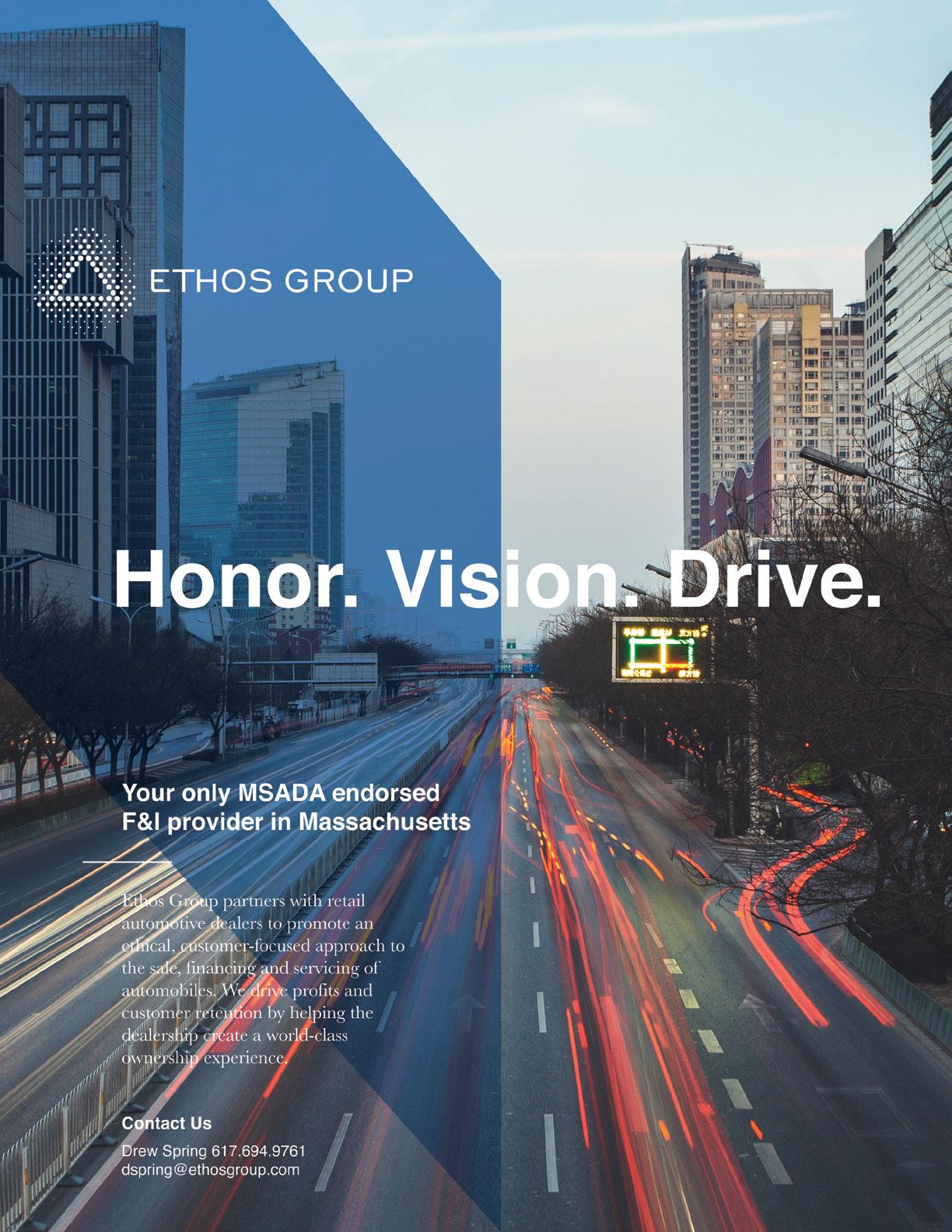
Patrick Manzi NADA Chief Economist
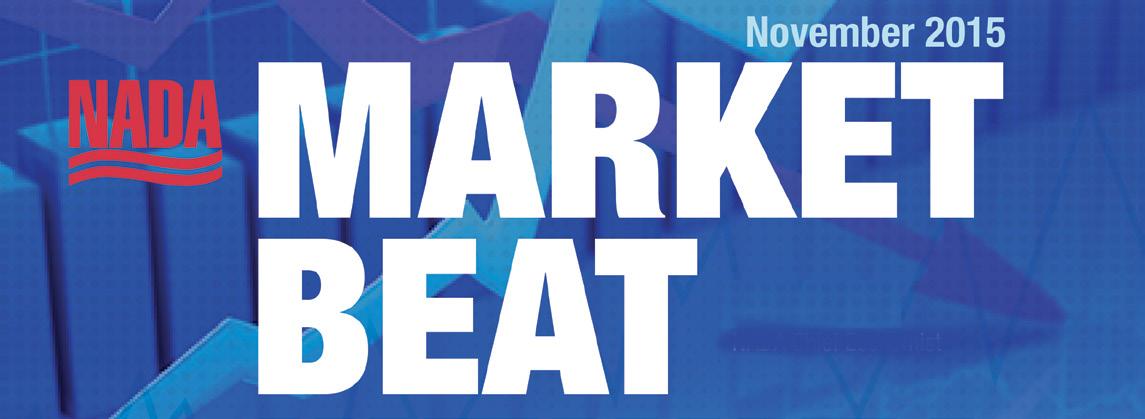
New light-vehicle sales in August 2025 totaled a SAAR of 16.1 million units, an increase of 6.1% year over year. Through the first eight months of the year, new light-vehicle sales are up 5.0% year over year on a SAAR basis. Tariff price increases are expected to appear in MSRP increases as OEMs transition from the 2025 to 2026 model year. August’s sales strength could indicate that some consumers want to secure their vehicle before the price increases kick in.
BEV sales were very strong in August as consumers headed to dealerships to purchase these vehicles before the tax-credit phaseout at the end of September 2025. In August 2025, BEV market share reached 9.7%, up 1.2 percentage points from July 2025 and the highest on record. Year-to-date BEVs have accounted for 7.7% of all new-vehicle sales this year. Looking ahead to September, we expect strong BEV sales for the month but believe
BEV sales will cool in the final quarter. Hybrid vehicles also continue to be hot sellers, accounting for 12.3% of all new-vehicle sales this year. Hybrid sales volume was a touch under 1.35 million units through August 2025, an increase of 34.8% year over year.
The August 2025 sales total included the Labor Day weekend. Typically, this is one of the biggest sales weekends of the year, and OEMs respond by increasing incentive spending. According to J.D. Power, OEMs have kept incentive activity relatively restrained due to tariffs. J.D. Power estimates that average incentive spending per unit will total $3,105, down $7 from July 2025 and up by $38 year over year. It remains to be seen how incentive spending will change for the 2026 model year given that many OEMs are expected to increase prices to offset higher tariff costs.
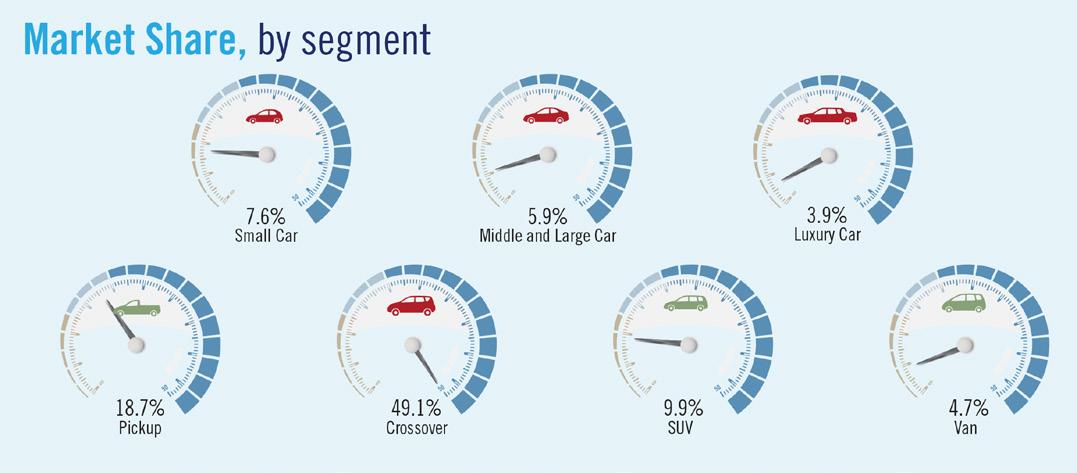

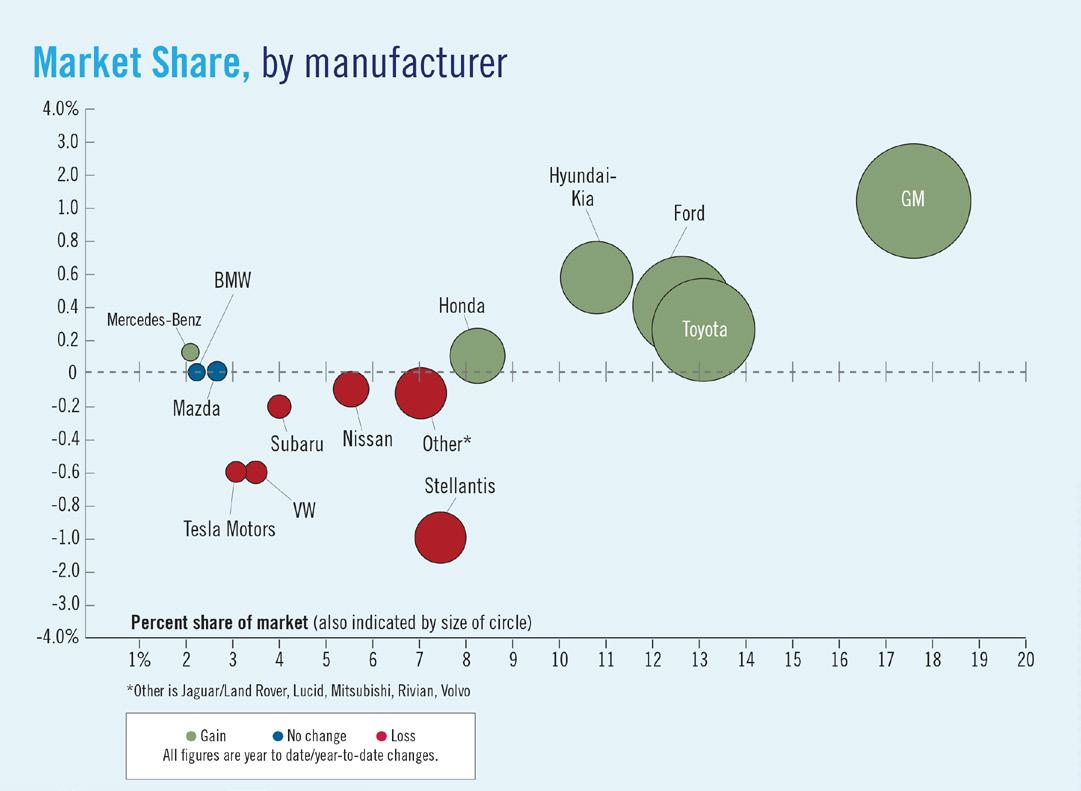

By Cody Lusk President & CEO, American International Auto Dealers Association
The American International Automobile Dealers Association (AIADA) is a national organization, headquartered in Washington, D.C., and focused on federal policy. We are the only advocacy group of our kind dedicated solely to the concerns on international nameplate auto dealers, meaning we have plenty of work to keep us busy.
That is why we appreciate and benefit so greatly from our partnership with state dealership associations. Groups like the Massachusetts State Automobile Dealers Association, which represents more than 425 new car and truck dealers, work tirelessly at the state level to preserve and grow the franchised auto retail system. That makes our job at the federal level a whole lot easier; we are able to speak to lawmakers with the full strength of America’s dealers and dealership employees behind us because state associations ensure their continued existence.
The franchise system is the backbone of our industry and the reason your voice as a dealer carries so much weight in your community and among legislative bodies. It encourages investment in big cities and small towns across the country, while driving competition. Dealers who want to succeed must be willing to offer competitive pricing and top-notch service, aiding car shoppers and manufacturers alike. In fact, a 2024 Oliver Wyman study showed that manufacturers benefit significantly by allowing dealers to shoulder a portion of operating costs and personalized services that would otherwise fall to the OEMs. Are there companies in the U.S. that
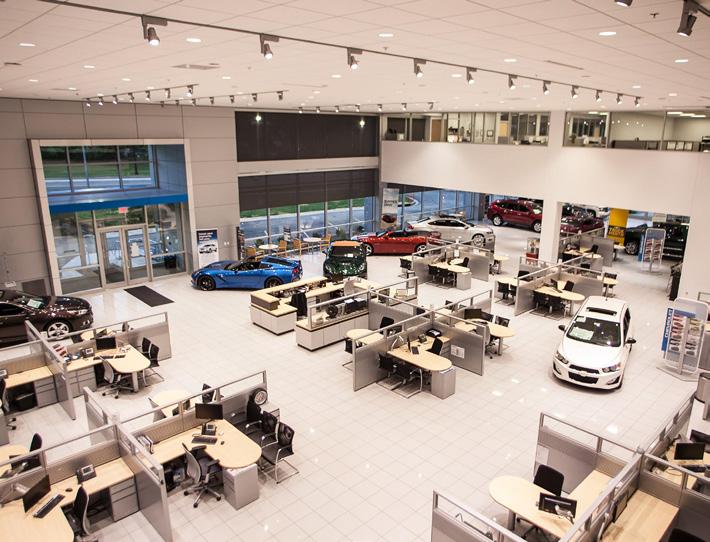
Across the U.S., international and domestic dealerships employ more than one million Americans and indirectly generate an additional 1.8 million jobs.
would love to apply their big box store philosophy to car buying? Of course. And consumers would get big box store service, which is why it never works. As dealers, you know the highly regulated world of motor sales requires detailed understanding of state, local, and federal laws, as well as a personal touch. A car or truck is, outside of a home, the largest purchase most Americans will ever make. It is important that we get it right the first time and offer customers additional security through warranties and dependable handling of recalls. Seamless test driving, financing, and repairs are not things that can be trusted to a car vending machine. Dealers generate stable, well-paying jobs in communities that big corporations do not reach. Across the U.S., interna-
tional and domestic dealerships employ more than one million Americans and indirectly generate an additional 1.8 million jobs. Franchised dealers also support their communities through local charities and organizations. Franchises keep Main Street humming, not Wall Street. And that is something worth continuing. When it comes to auto franchises, American lawmakers should remember the old maxim: If it ain’t broke, don’t fix it. Franchised dealerships have worked in American for nearly a hundred years, through massive changes in taste and technology, and through every economic condition you can imagine. It is a system that works, and it is one worth working to preserve.
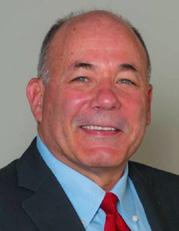
By Scott Pearson Chairman, American Truck Dealers
I recently returned from NADA’s Washington Conference. Like our ATD Legislative Fly-In, this annual event brings auto dealers from every state to Capitol Hill, where they advocate for dealer legislative priorities.
In addition to the auto dealers, our state and metro ATAEs and some fellow commercial truck dealers joined me in these critical advocacy efforts. We were able to connect with our Congressional legislators and discuss our top issues, including right to repair proposals and the repeal of the federal excise tax on trucks.
As dealers, we are the voices of our business and our employees. We also represent our customers and the truck market industry. That is why it is so important that we tell our elected officials about what we are experiencing on the ground in the commercial truck industry – what is working and what is not.
Our past efforts enabled us to achieve success in June on the repeal of the EPA approvals of CARB’s ZEV truck mandates under the Advanced Clean Trucks rule and the imposition of stringent heavy-duty truck NOx emissions requirements, the so-called HDO rule. We expressed our appreciation to those Members of Congress who were on the side of repeal.
While on Capitol Hill, we specifically covered:
• So-called “right to repair” legislation: ATD opposes this legislation, which has little to do with repairing a vehicle. Instead, the bill compels truck and auto manufacturers to provide any “aftermarket parts manufacturer” the information necessary “to produce or offer compatible aftermarket parts”. This legislation sweeps in heavy-duty trucks and would give any third-party access to sensitive truck buyer data from vehicles, which raises privacy, vehicle security, and safety concerns.
• Supporting Catalytic Converter Anti-Theft Legislation: Catalytic converter theft continues to rise across the nation. We urged Members of Congress to cosponsor the PART Act, which would provide local law enforcement with the resources necessary to combat this crime. ATD is working to
add diesel particulate filters and diesel oxidation catalysts to the bill, so the theft of these devices would also be a federal crime.
• Repealing the 12% Federal Excise Tax on Heavy-Duty Trucks: We urged Members of Congress to cosponsor the bipartisan “Modern, Clean and Safe Trucks Act of 2025.” The legislation would repeal the 12% FET on heavy-duty trucks and help promote the transition to a cleaner, greener, and safer truck fleet.
As we walked the halls of Congress, our assignment was to tell our elected officials what is happening on the ground in the truck market. Now, our assignment for all truck dealers is to show legislators – federal, state, and local – what is happening to our small businesses.
How do we do that?
• Invite your elected officials and industry regulators to your dealerships. Most people do not understand our business, including the people regulating it. The best way to educate them is by bringing them to your dealership where they can see the business in action and meet your employees and customers.
• Schedule meetings in your state capitals. If you cannot bring your legislators to you, go to them. Explain to them the needs of your customers and how their business and yours are impacted by state and federal regulations.
• Engage with your Automotive Trade Association Executives (ATAEs). If you are not involved in your state or metro dealer association, reach out to ATD and ask how you can build that relationship and for contact information. You can email ATD President Jacqueline Gelb at gelbj@nada.org to get the contact info. If you are already a member of your local dealer association, contact them and tell them you want to support advocacy on these important issues and ask how you can help. Everyone needs to be aware of the policies that are coming out of Washington and your respective states. Educate yourselves, your team, and then educate your policymakers. During this critical time and given the many issues we are facing, we all must take action.
By Maryann Malesardi NADA Senior Manager, Event Marketing
Put the pedal to the metal: registration and housing are now officially open for ATD Show 2026! Join us at the luxurious Wynn Las Vegas, February 3-5, 2026 — that’s right, ATD Show 2026 starts on Tuesday! You spoke, ATD listened!
Register today to connect with fellow truck dealers and managers, OEM representatives, and industry leaders for three dynamic days of education, networking, and business solutions designed to move your dealership forward. And do not forget to bring your crew! Together, we are driving success.
Las Vegas is an exciting backdrop for both ATD Show 2026 and NADA Show 2026. And only ATD Show registrants get access to it all! And, with a high-octane NADA welcome reception at F1 Grand Prix Plaza, one of Las Vegas’ hottest new venues, you will want to race to register!
Visit atdshow.org to secure your spot and book your hotel. See you at the Wynn Las Vegas in February!
On September 25, President Donald J. Trump announced a new 25 percent tariff on heavy-duty trucks that will begin on October 1. The new tariff will be imposed under Section 232 of the Trade Expansion Act of 1962 (Section 232), which allows the President to impose a tariff on imported goods that threaten national security.
In April, the U.S. Department of Commerce initiated an investigation into “The Effect of Imports of Medium-Duty Trucks, Heavy-Duty Trucks, and Medium- and Heavy-Duty Truck Parts on the National Security.” President Trump’s announcement suggests the completion of this Section 232 investigation.
ATD submitted a comment opposing the imposition of additional tariffs and the removal of existing tariffs on the trucking industry. ATD’s comment explained that the trucking industry in recent months has faced (i) new tariffs that increased costs, (ii) decreased sales, (iii) the loss of more jobs, and (iv) a clouded economic outlook.
ATD issued the following statement on September 26:
“American truck dealers pride themselves on equipping their customers with the right truck configuration to ensure economic security in moving America’s supply chain. The truck industry is facing unusually high equipment costs and economic uncertainty. The tariffs announced Thursday could further strain the financial viability of our customers, manufacturers, and truck dealers. Further, the government should reduce the financial burden by repealing the outdated Federal Excise Tax, which costs upwards of $25,000 for each new truck.”
The White House and the Department of Commerce have not yet released specific details of the new tariffs. ATD will provide updates as more information becomes available.
This month, Lucas Deal, Trucks, Parts, Service announced nominations are now open for the 2026 Truck Dealer of the Year Award. The due date for nominations is October 17.
Please go to www.truckpartsandservice.com to nominate a truck dealer. Be sure to confirm with your nominee ahead of time that he/ she will accept the nomination before submitting his or her name and information. The eligibility requirements are the following:
• Has not won the award in the past.
• A member in good standing of the American Truck Dealers division of NADA.
• Actively engaged in the management of their dealership(s), working a minimum of 30 hours per week.
• Hold the position of operating head of the dealership as designated in the franchise paragraph of the factory agreement, or the owner’s designated agent with full authority for business operations for a minimum of one year.
• The nominee has spent at least five years as a major equity owner or general manager of the dealership.
Please contact ATD’s Kim Carey at kcarey@nada.org if you have any questions.
By Jason Cannon Commercial Carrier Journal
New data shows electric trucks are priced $90,000 more than trucks in Europe, despite falling battery costs and incentives designed to make clean trucks more affordable. A new study by the International Council on Clean Transportation (ICCT) shows the cost of Class 8 heavy trucks in the U.S. jumped by 27% ($87,100) between 2020 and 2025, while the cost of a similar truck in Europe fell by 23%.
The median price of a model year 2024 battery-electric heavy-duty tractor truck in the United States, according to ICCT, is $379,800—roughly 2.5 times the price of a combustion engine tractor. The contrast between Class 8 tractor truck price changes in the EU and the United States, the report said, reinforces the findings of CARB’s 2024 pricing memo that battery-electric Class 8 tractor truck prices were moving in opposite directions in the United States and Europe.
Truck manufacturers cited changes in raw material costs and higher demand for vehicle warranties, along with differences in U.S. and European supply chains, as causes for differences in pricing patterns between the two markets. Differences in the timing of the introduction of next-generation products in the United States and Europe further explain the comparative differences across markets, according to the report, since faster deployment of the latest generation of technology in Europe may deliver performance and cost advantages over the U.S. market.

Scott Dube, Partner at McGovern HyunDai rt. 93, rePreSentS naDa’S MaSSacHuSettS MeMberS on tHe naDa boarD of DirectorS. He can be reacHeD at SDube@ McGovernauto.coM.
This month, we held another successful Washington Conference – the 50th edition of our annual event – where your MSADA representatives and your fellow dealers’ footsteps echoed in the halls of our Nation’s capital. Over 400 dealers, their key managers, and auto dealer association executives attended and participated in over 200 Congressional visits during the conference. You can find more details of our trip in this month’s magazine, including a recap of NADA’s key legislative issues for this year.
I want to give a heartfelt “thank you” to our hardworking MSADA and NADA staffs and all the dealers from across the country who took the time to make the trip to D.C. Our collective voice is that much stronger when we band together. In particular, I thank Chris Connolly, Adam Silverleib, Vincent Mastria, and Mike Sullivan for being part of Team Massachusetts as we visited with our Members of Congress and their staffs.
Finally, our NADA Show 2026 in Las Vegas is coming up on February 3-6. It is not too late to register. The exhibition floor space is sold out, and hotel rooms are going fast. You can find all the necessary registration information below and on www. nada.org
By Maryann Malesardi NADA Senior Manager, Event Marketing
NADA Show 2026 kicks off Tuesday, February 3, in Las Vegas, and with 20,000-plus attendees expected, discounted hotel rooms are filling fast. Don’t miss your first choice.
dustry partners for the Auto Industry Event of the Year. From game-changing education sessions to an expansive Expo packed with the latest innovations, plus franchise meetings and more, there is something for everyone. NADA Show delivers the tools, insights and connections you need to drive your dealership’s success in 2026 and beyond.
Do not wait. Register online today at www.nada.org/nada-show-attend.
We also recently announced our Main Stage speakers. These world-class keynoters are champions of resilience, leadership, and peak performance. And they are bringing bold insights, big energy, and a fresh perspective to Las Vegas. Here’s who’s taking center stage:
Jon Dorenbos: Best known as the long snapper for the Philadelphia Eagles, where he earned two Pro Bowl selections (2009 and 2014), Jon Dorenbos is a world-class magician who wowed audiences as a finalist on America’s Got Talent. Through humor, heart, and sleight-of-hand, Dorenbos shares unforgettable lessons learned in overcoming adversity with resilience, grit, and positivity.
Molly Fletcher: Hailed as the “female Jerry Maguire” by CNN, Molly Fletcher spent nearly 20 years as a top sports agent, representing more than 300 of the world’s elite athletes and coaches. She draws from her unique experience breaking barriers in a male-dominated industry to help others unlock their full potential.
Magic Johnson: From the court to the boardroom, Earvin “Magic” Johnson has built a billion-dollar business empire on hustle, heart, and vision. The two-time Hall of Famer, Olympic gold medalist, and Presidential Medal of Freedom recipient leads Magic Johnson Enterprises, with investments spanning sports, tech, infrastructure, and financial services. He offers a glimpse at his playbook for success and what it takes to lead teams to greatness — in sports, in business, and in life.
Finally, Main Stage will also feature exclusive updates from NADA leadership, compelling insights from industry thought leaders, and the presentation of the 2026 TIME Dealer of the Year.
NADA partners with top hotels to offer you the best rates. How to choose? Think location, location, location. Properties close to the Las Vegas Convention Center offer unbeatable convenience. But the demand is high for these and other legendary properties.
Join thousands of dealers, managers, OEM reps, and in-
The following is the September 2025 Issues Update from NADA President and CEO Mike Stanton. This covers the issues not addressed in this month’s cover story.
There have been two significant developments regarding tariffs. First, on August 21, the Trump administration announced that it would maintain a 27.5% tariff on cars imported from the European Union until Europe agrees to reduce tariffs on other
U.S. products. The administration stated that it would reduce the car tariff to 15% once the EU officially begins the process of cutting tariffs on U.S. products, such as seafood, nuts, dairy, fruits, and vegetables. A week later, the European Commission proposed to withdraw tariffs on U.S. industrial goods in exchange for reduced U.S. tariffs on European cars.
Second, on August 29, the U.S. Court of Appeals for the Federal Circuit ruled that President Trump overstepped his authority when he declared national emergencies to justify tariffs on nearly every country. This ruling largely upholds a May decision by a federal trade court in New York, which we previously reported. The legal news released late last month is expected to continue causing market volatility, as the court has decided to keep the tariffs in place until October 14, allowing the Trump administration the opportunity to request a review from the Supreme Court.
NADA Advocacy: NADA has advocated against the imposition of tariffs on autos and auto parts from U.S. trading partners with the administration, emphasizing the effect tariffs will have on vehicle affordability, vehicle sales, and dealership viability. NADA has met with the White House, Office of the U.S. Trade Representative, Department of Treasury, Department of Commerce, other government agencies, and Congress to discuss the impact of tariffs on dealers and consumers.
standards, despite federal preemption, continues to cause uncertainty among automakers and heavy-duty truck manufacturers. These legal challenges could test California’s ability to implement its own emissions regulations moving forward.
What’s next: NADA/ATD is closely reviewing these cases to determine next steps. We will continue to provide updates as developments occur.
On August 19, the California New Car Dealers Association (CNCDA) filed a lawsuit against the American Honda Motor Co., Sony Honda Mobility Inc (SMH). and Sony Honda Mobility of America Inc., for violating California state franchise laws.
NADA has directly and publicly communicated to VW and Scout leadership that the franchise system is the best and mostefficient way to deliver the customer experience that today’s marketplace demands.
What’s next: NADA is engaging the administration to best inform its decisions regarding tariffs, stressing that franchised auto dealers are fully American businesses, predominantly small businesses, and that tariffs impact them regardless of whether they sell domestic or international vehicles.
On August 15, the Justice Department announced it had filed two lawsuits in federal court against the California Air Resources Board (CARB), aiming to block California from enforcing its heavy-duty truck emissions standards. The DOJ is arguing that CARB is unlawfully using its “Clean Truck Partnership” to enforce rules that are preempted by federal law.
In one case, the government has sought to join a suit filed by four major heavy-duty truck manufacturers—Daimler Truck North America, International Motors, Paccar Inc., and Volvo Group North America—against CARB. The OEMs are contesting CARB’s attempt to enforce its own emissions standards for heavy-duty vehicles despite the enactment of the CRA measures that prohibit CARB from enforcing its own rules.
Why it matters: CARB’s attempt to enforce its emission
Why it matters: California’s state franchise law is explicit; automakers are prohibited from creating or affiliating with separate brands that compete with their franchised dealers. CNCDA legally asserts that SMH’s so-called joint venture is effectively an extension of Honda rather than a truly independent entity, which is harming and competing against the state’s Honda and Acura dealers. From the outset, NADA has made it clear to Honda that any misguided attempt to bypass or undercut its U.S. dealers will be challenged in statehouses and courthouses across the country – with NADA’s full support.
What’s next: NADA will continue to support CNCDA’s legal actions and provide updates on the progress of this lawsuit.
The California New Car Dealers Association (CNCDA) filed a lawsuit with the Superior Court of California against Volkswagen Group and Scout Motors Inc., seeking to block the company’s plans to sell vehicles directly to consumers in the state. The lawsuit asserts that Volkswagen is illegally competing with its dealer partners through its affiliate, Scout Motors. CNCDA’s lawsuit follows the same legal action taken by Florida VW and Audi dealers in Miami-Dade County Circuit Court earlier this year to block Scout’s direct-sales attempt in the state.
Why it matters: Since VW AG signaled the reemergence of the Scout brand in the U.S., NADA has directly and publicly communicated to VW and Scout leadership that the franchise system is the best and most-efficient way to deliver the customer experience that today’s marketplace demands.
What’s next: NADA will continue to work with state and metro dealer associations to protect the franchise system and stand behind our Volkswagen and Audi dealers across the country.


